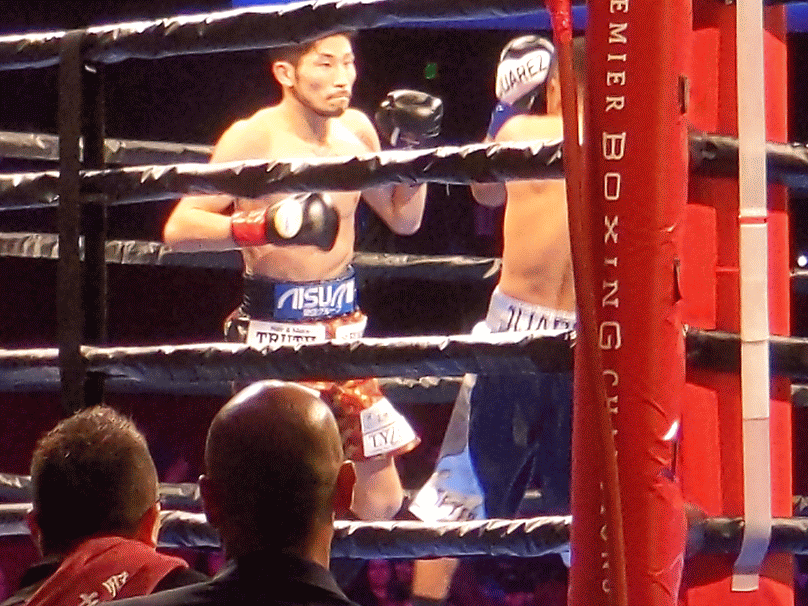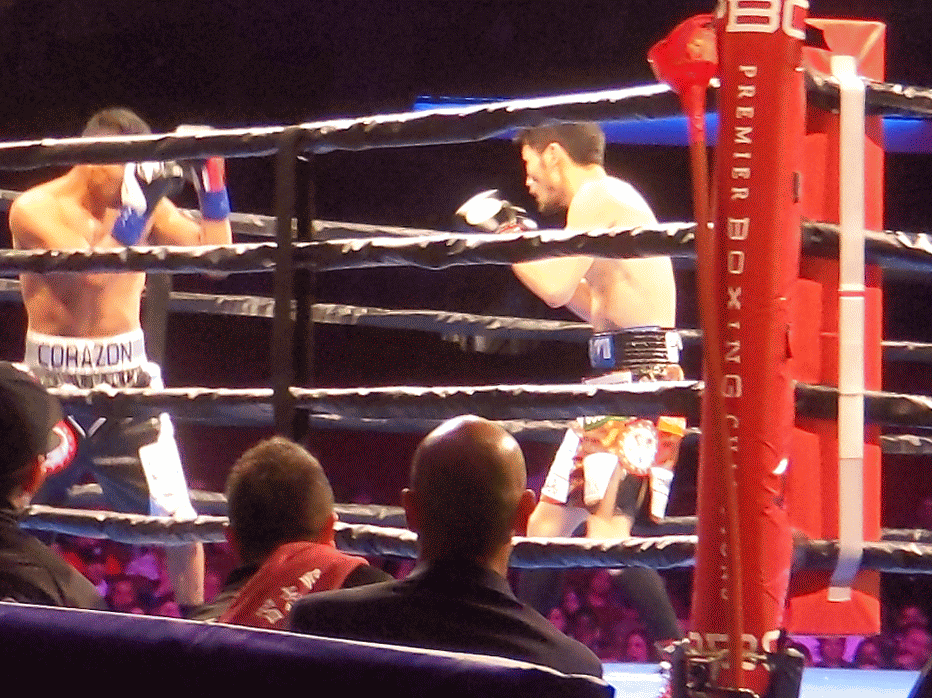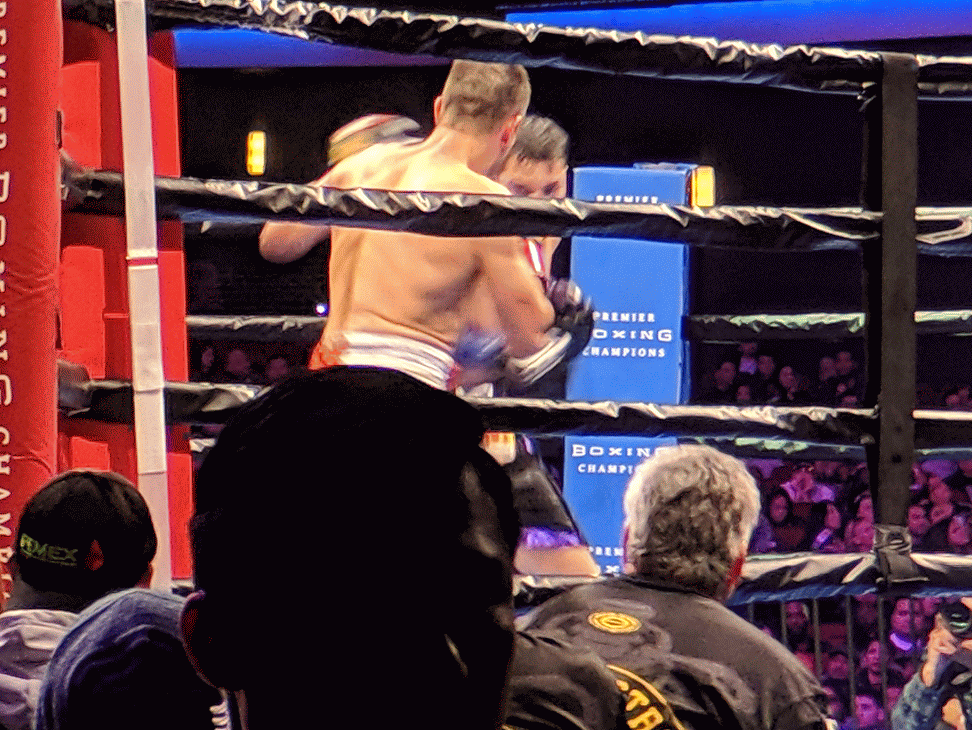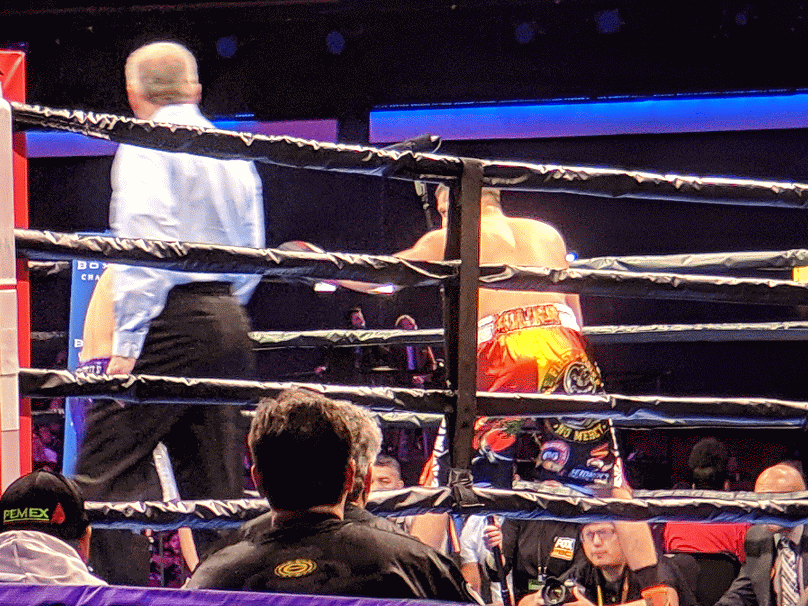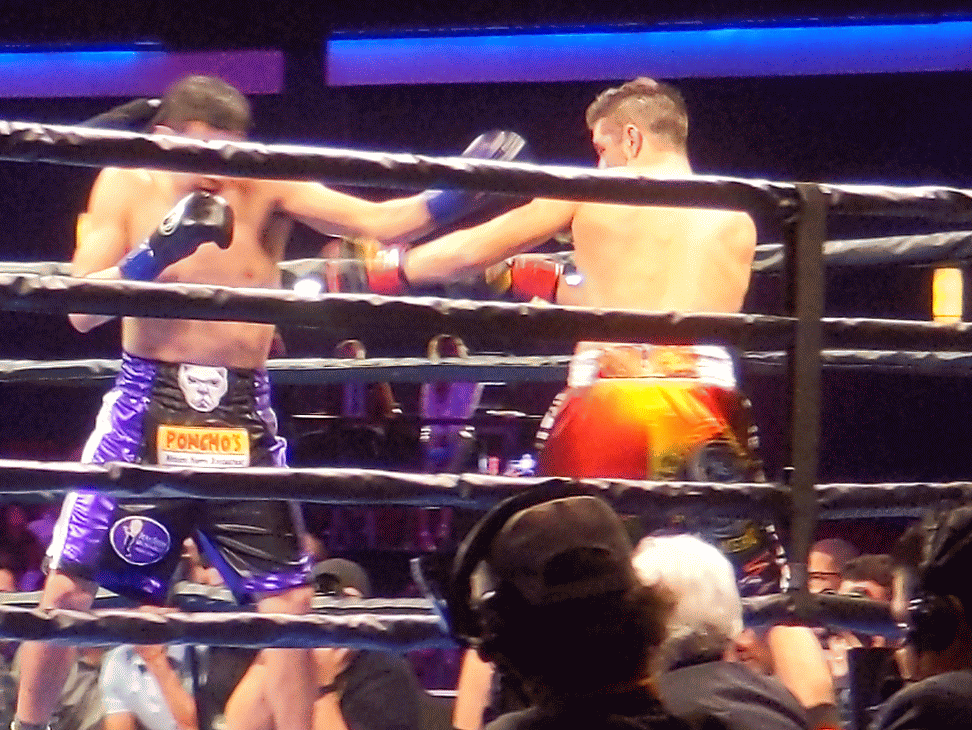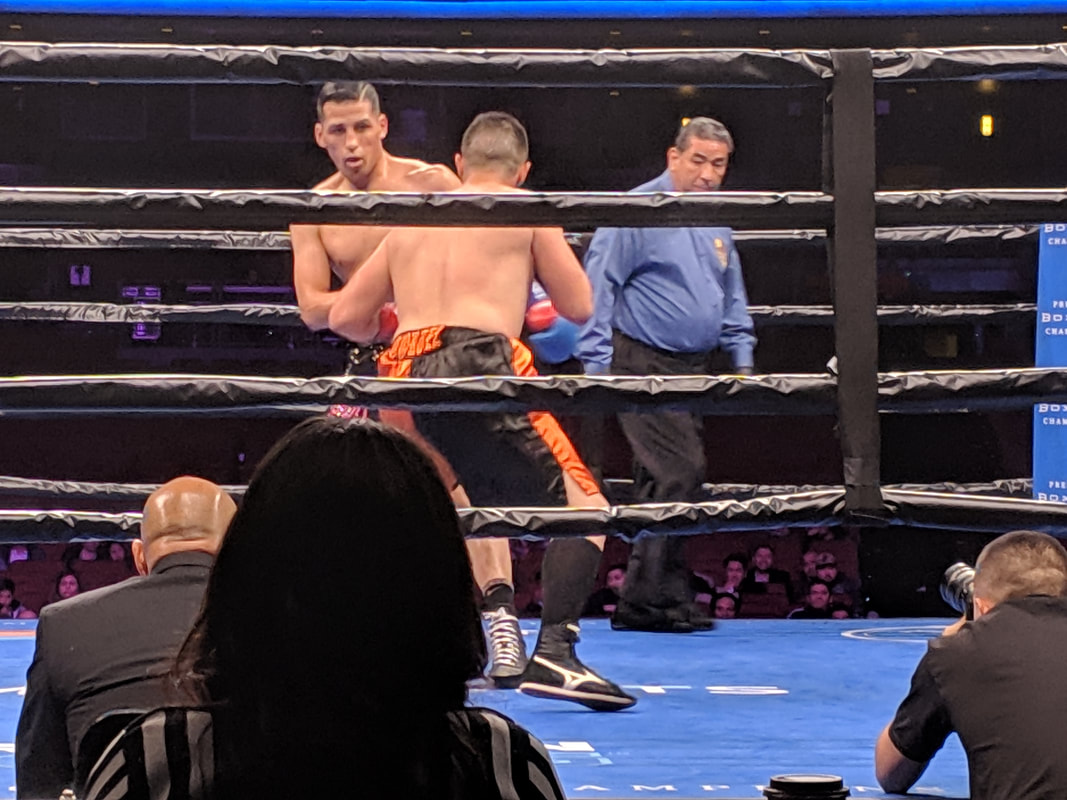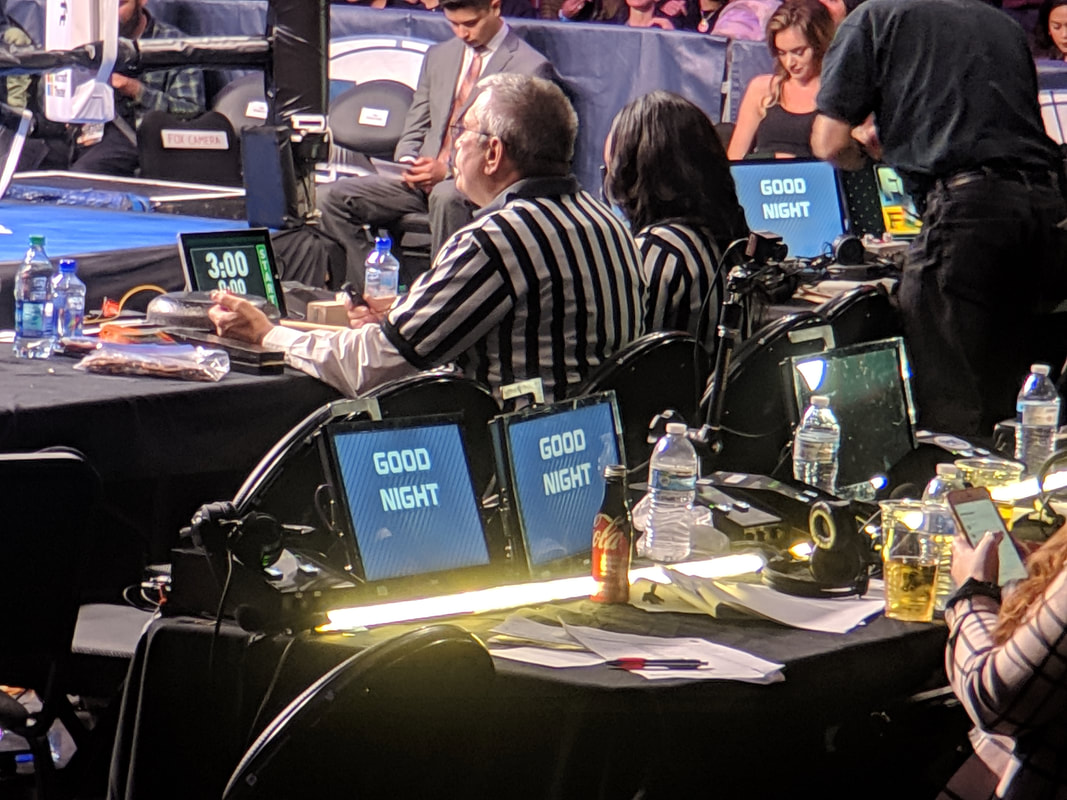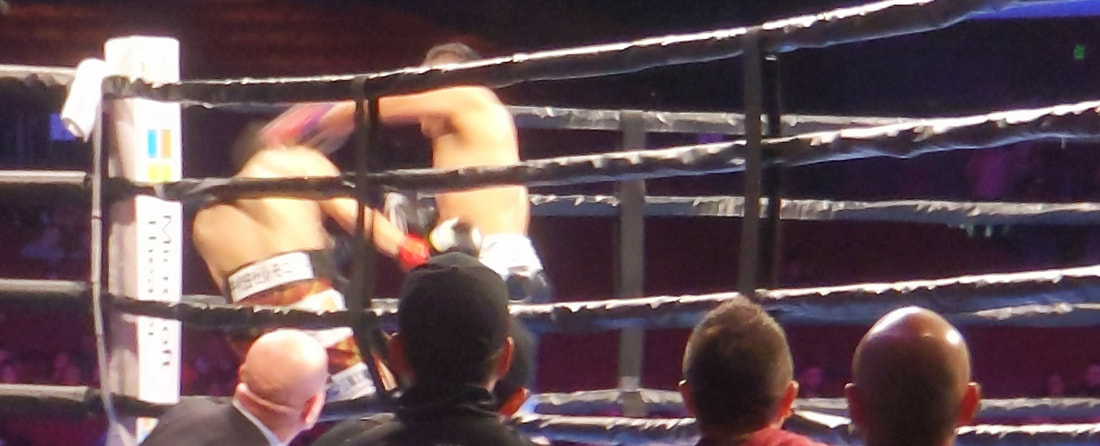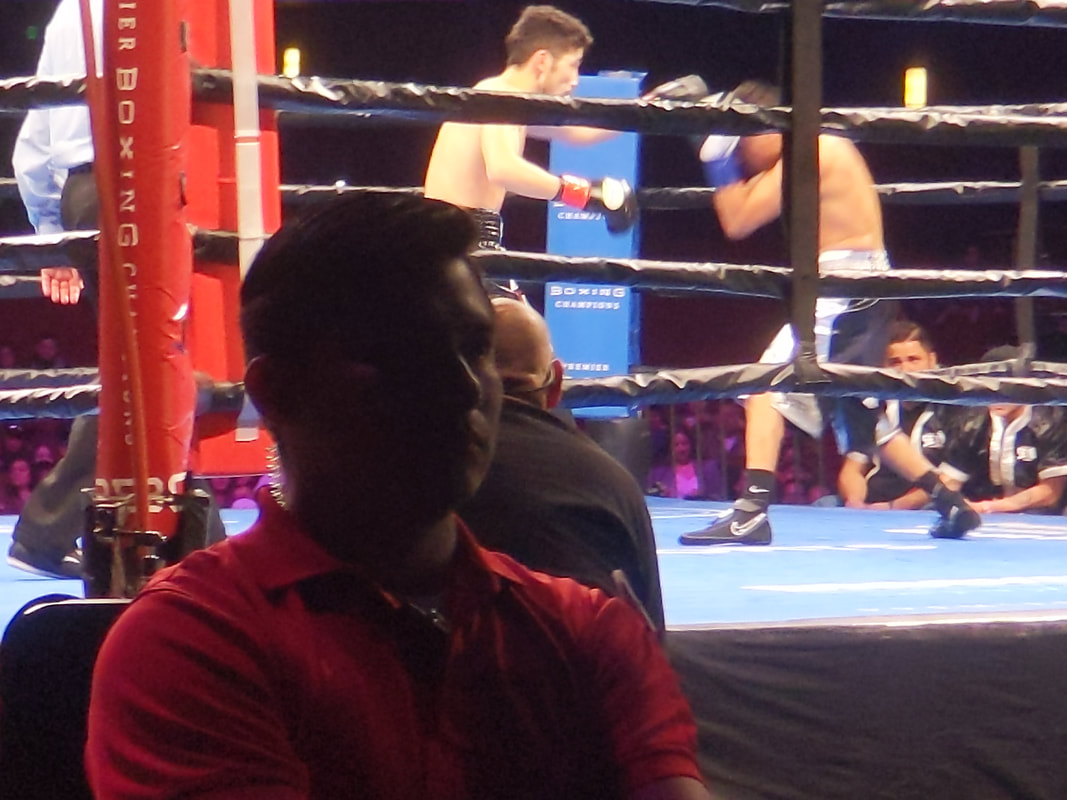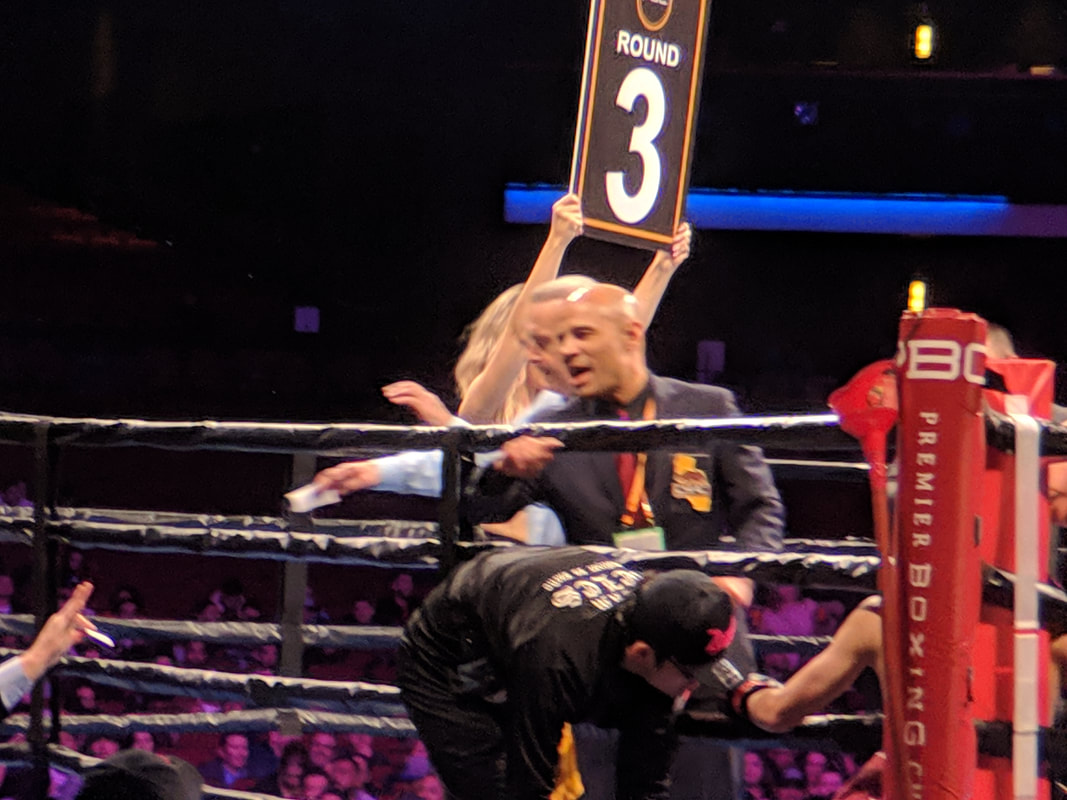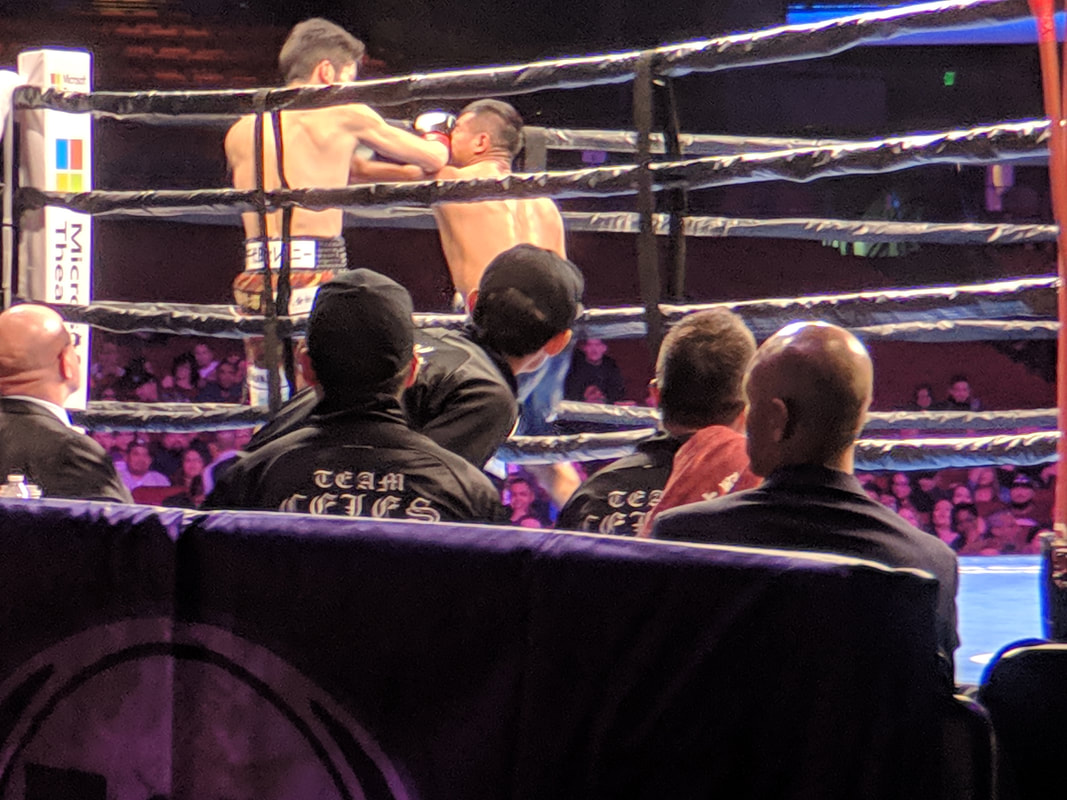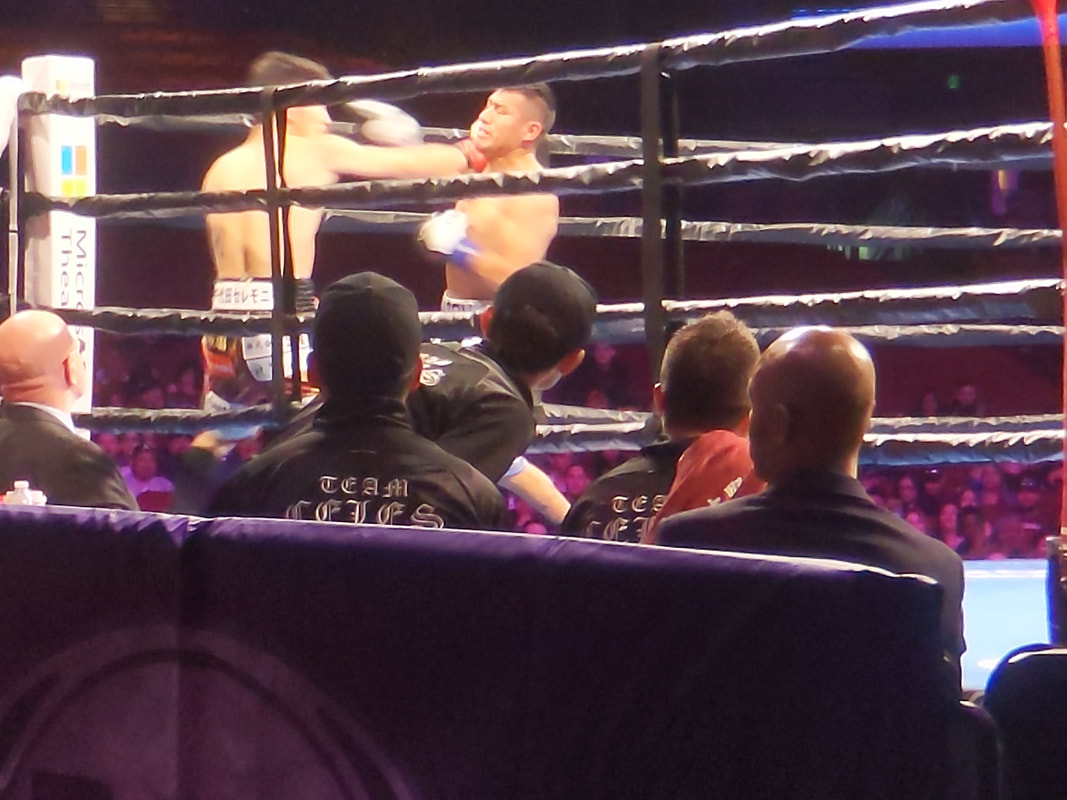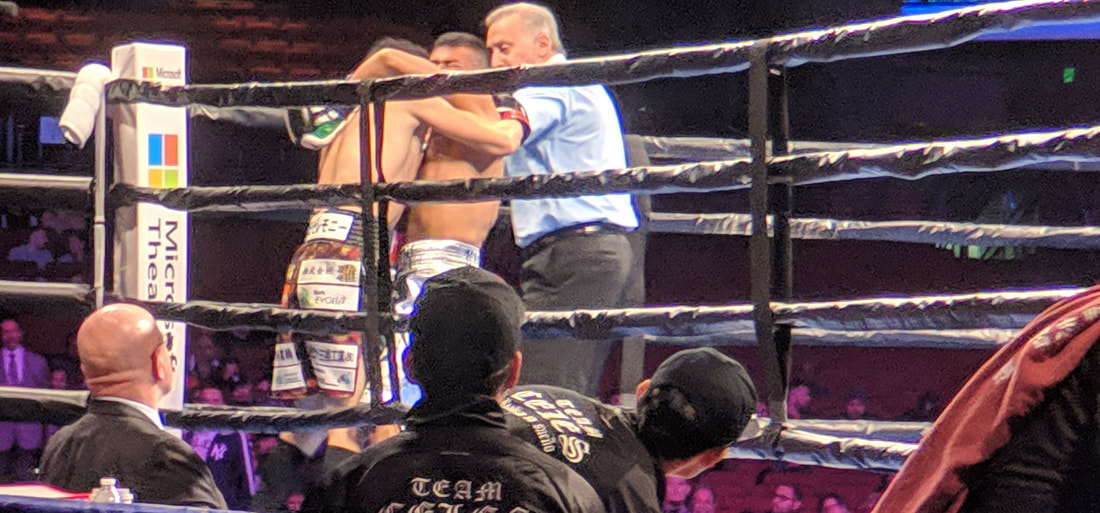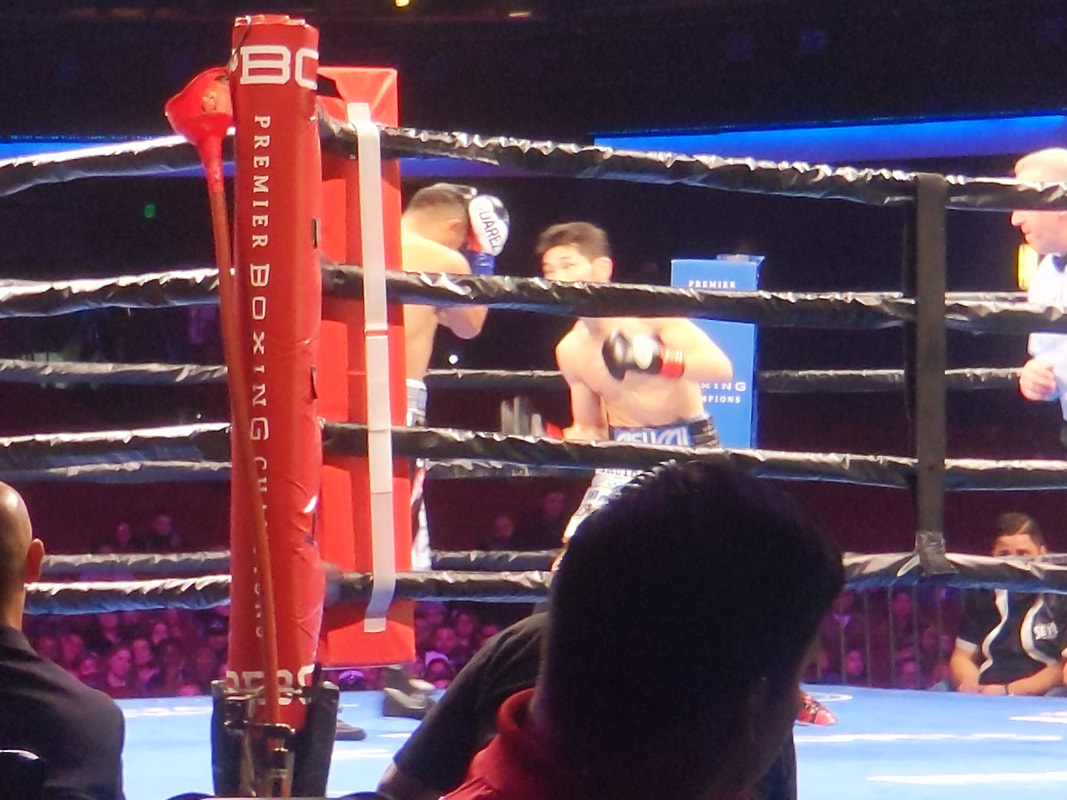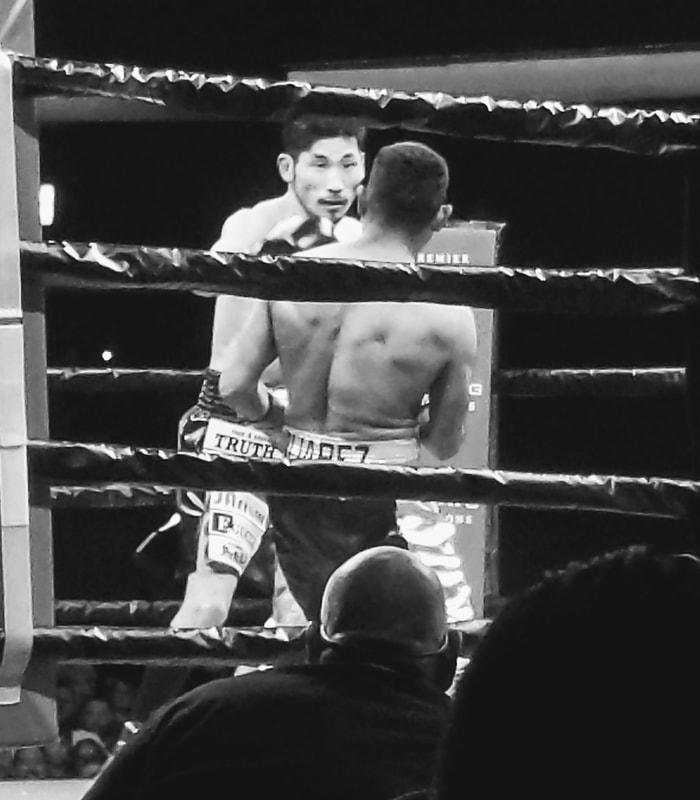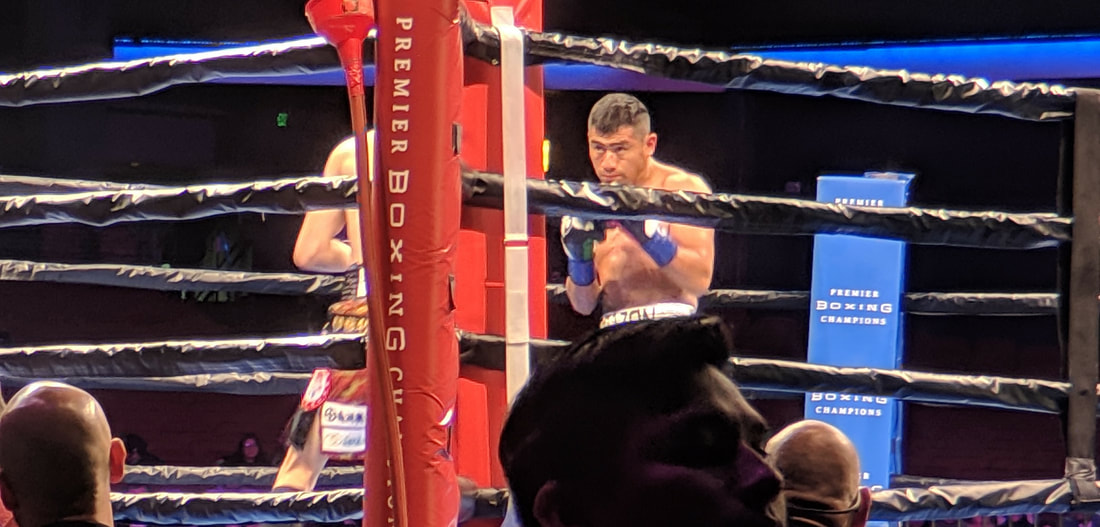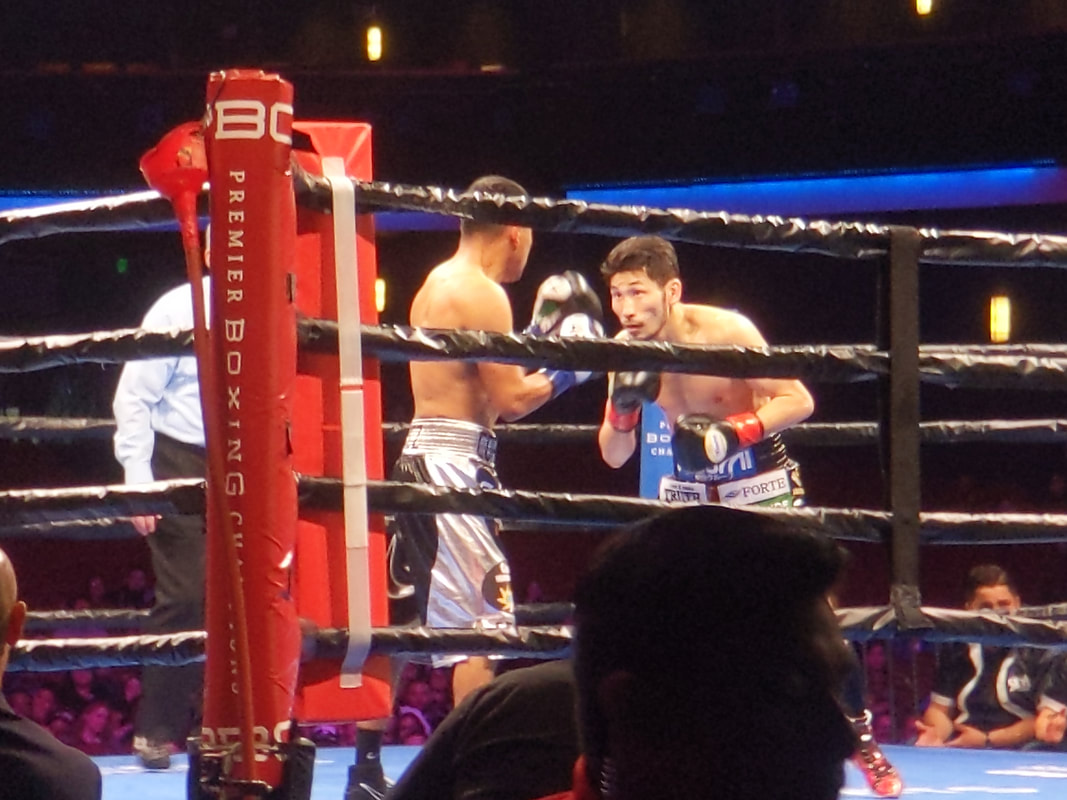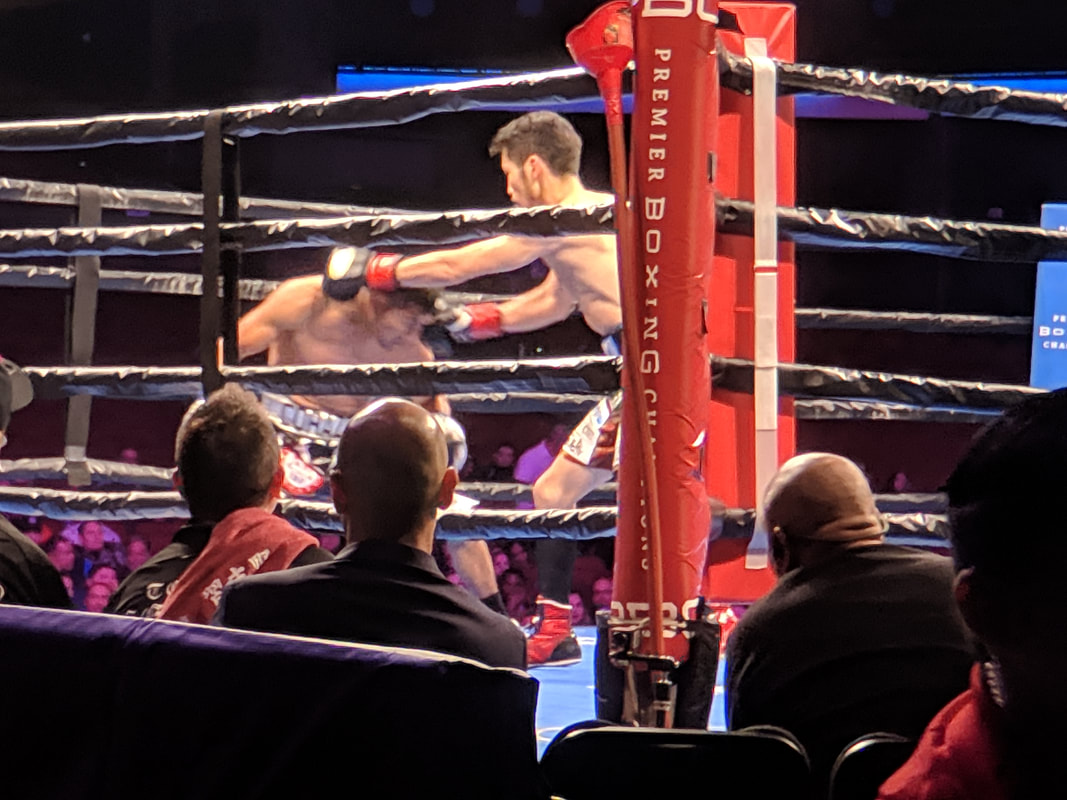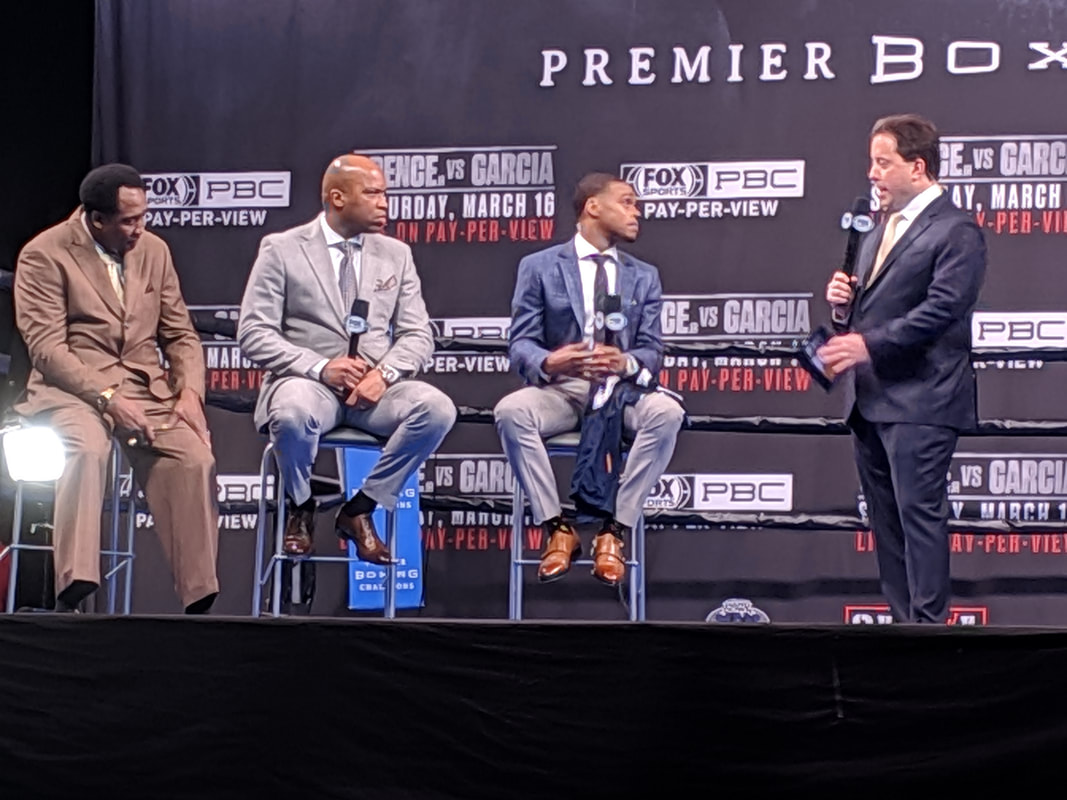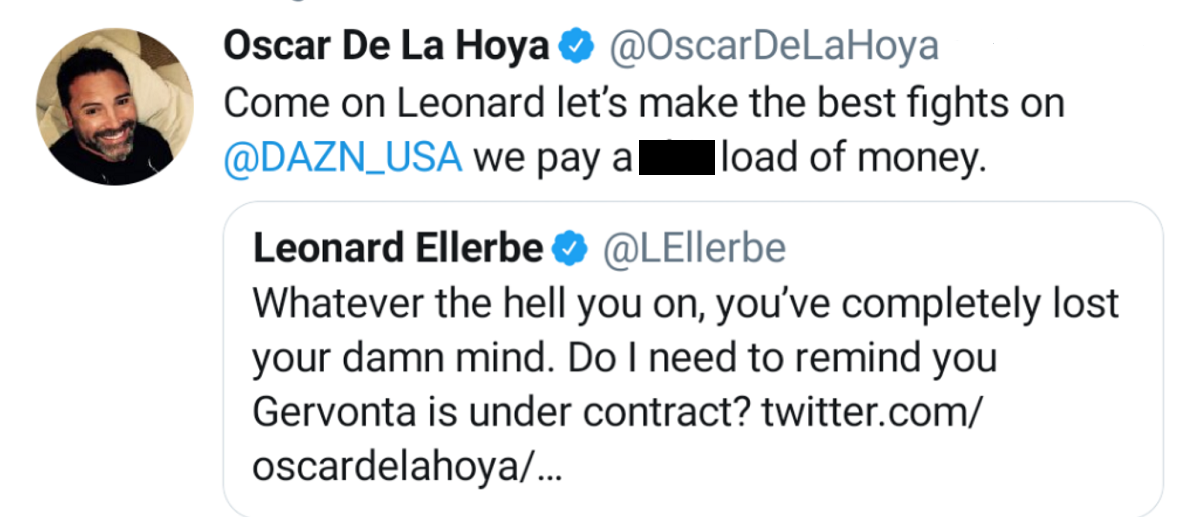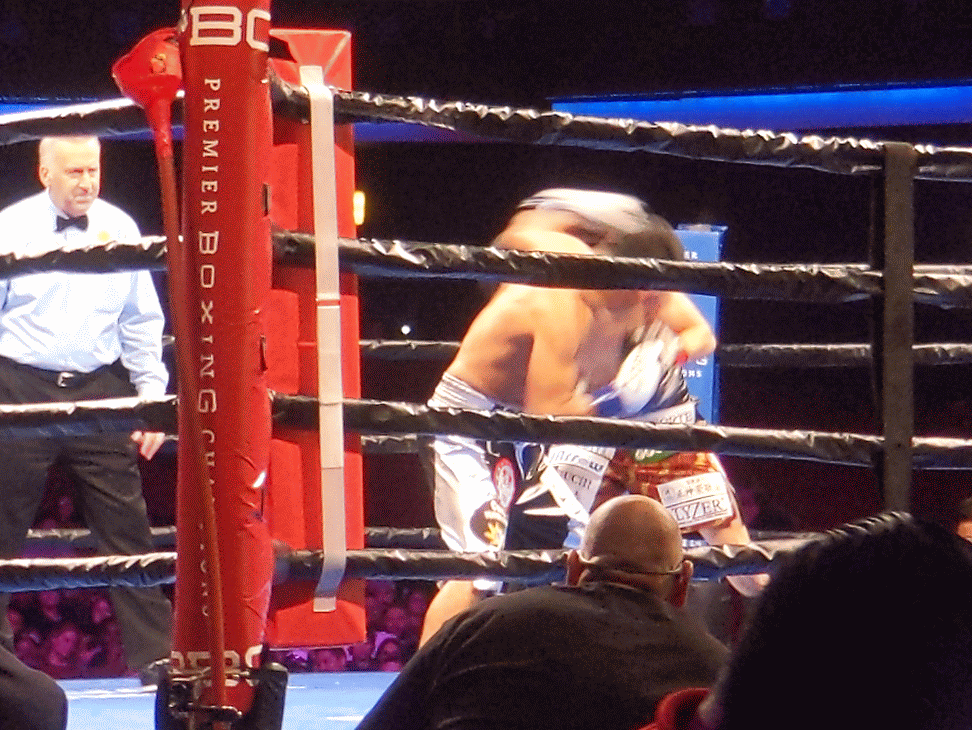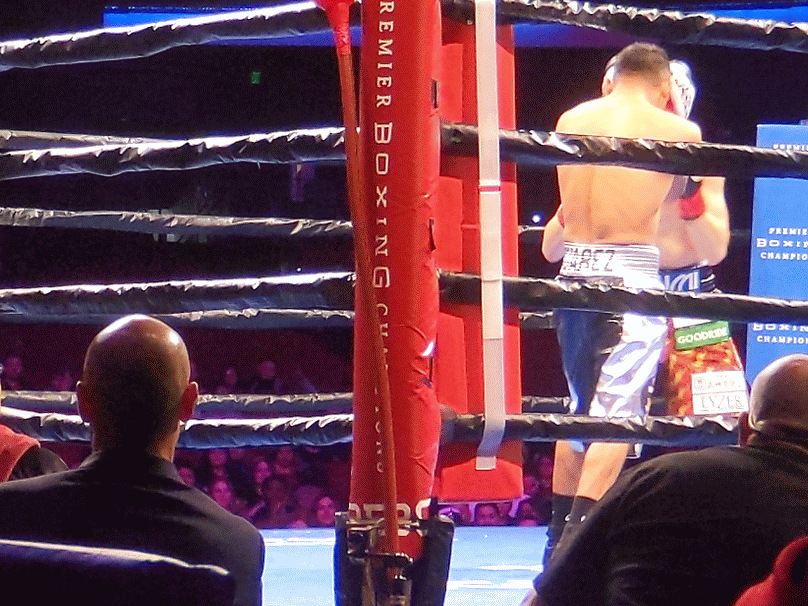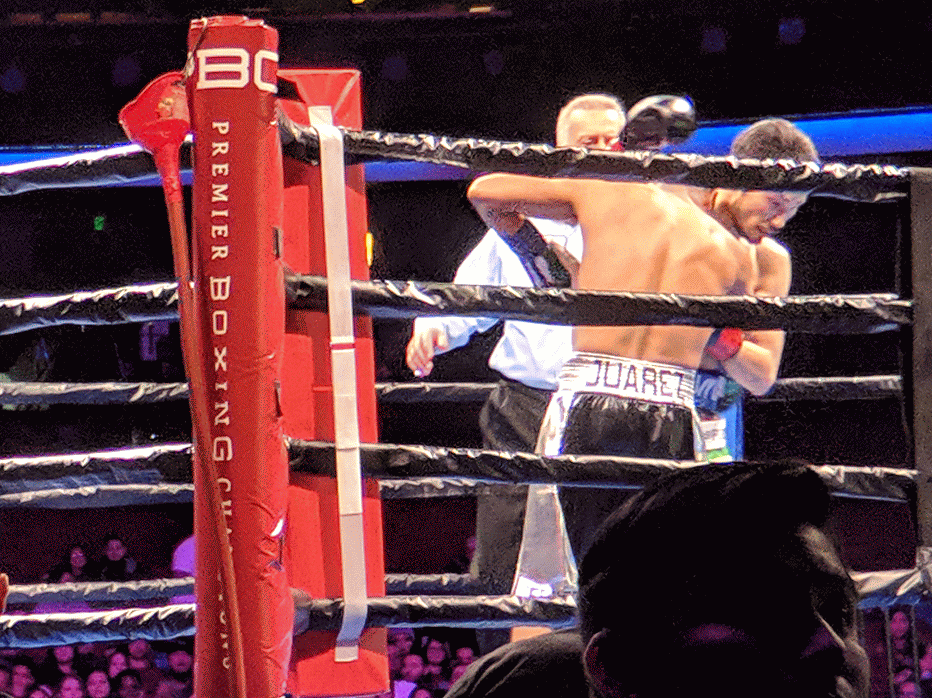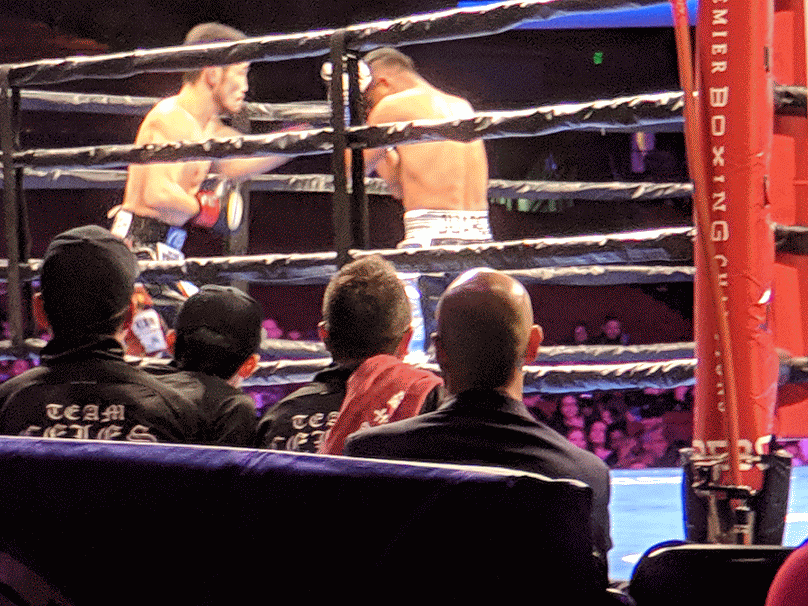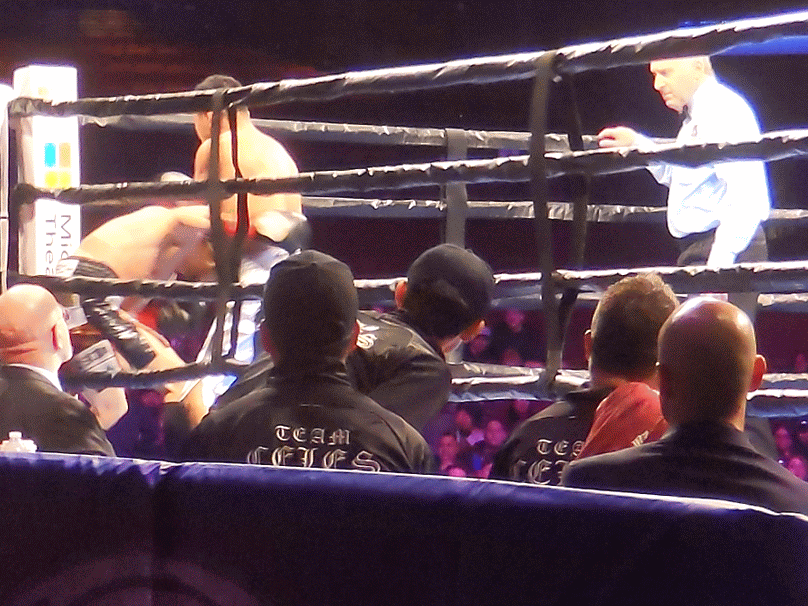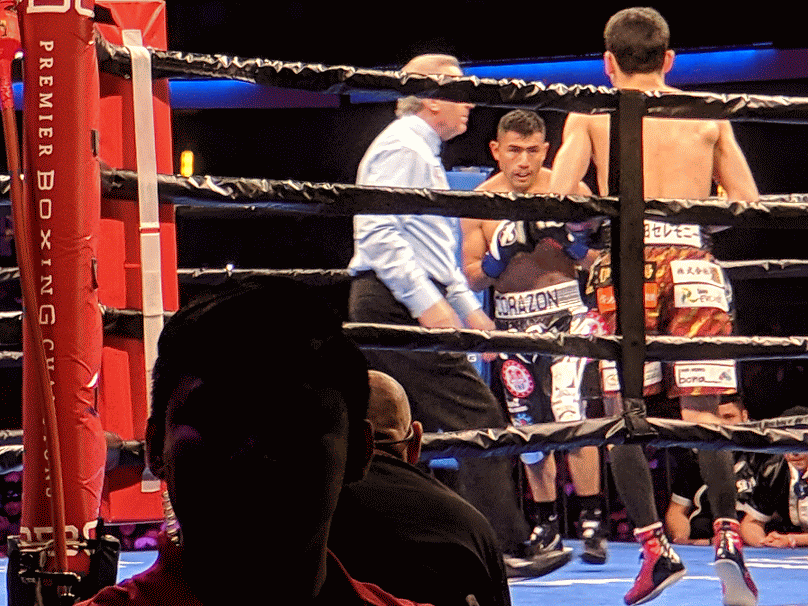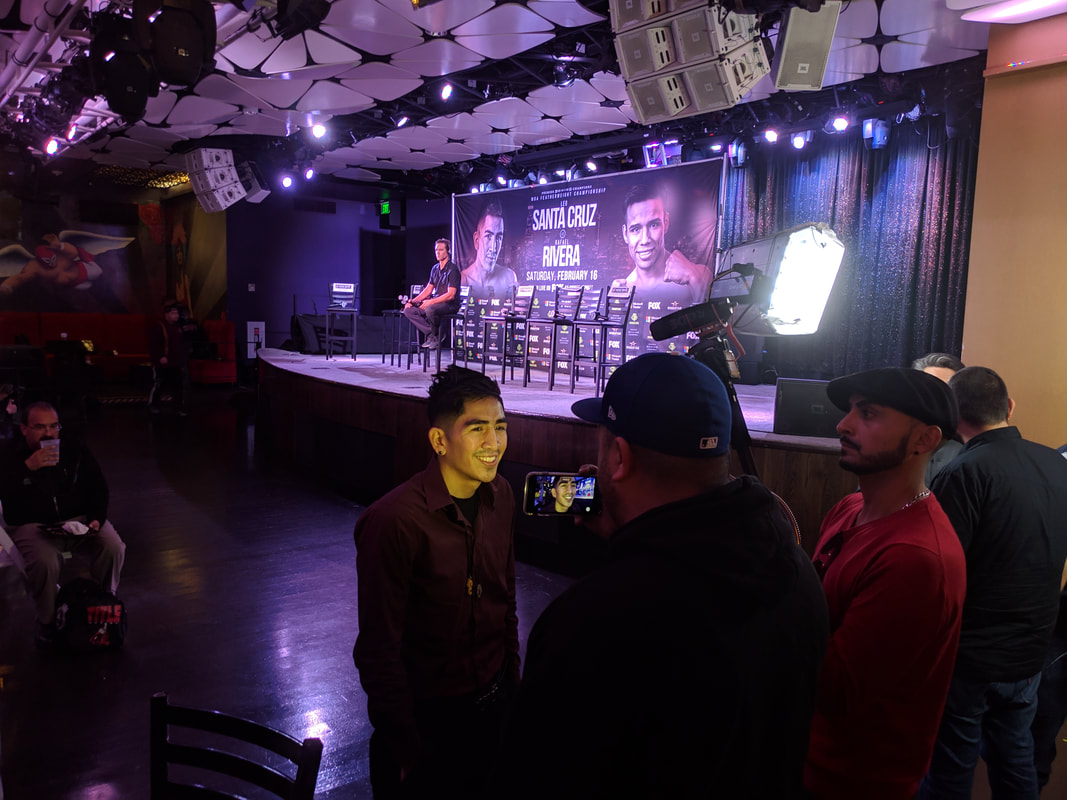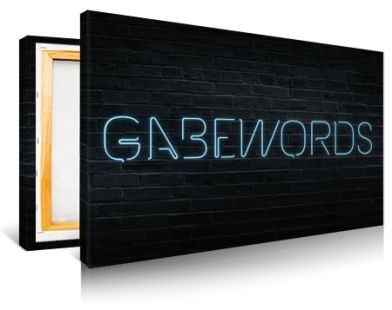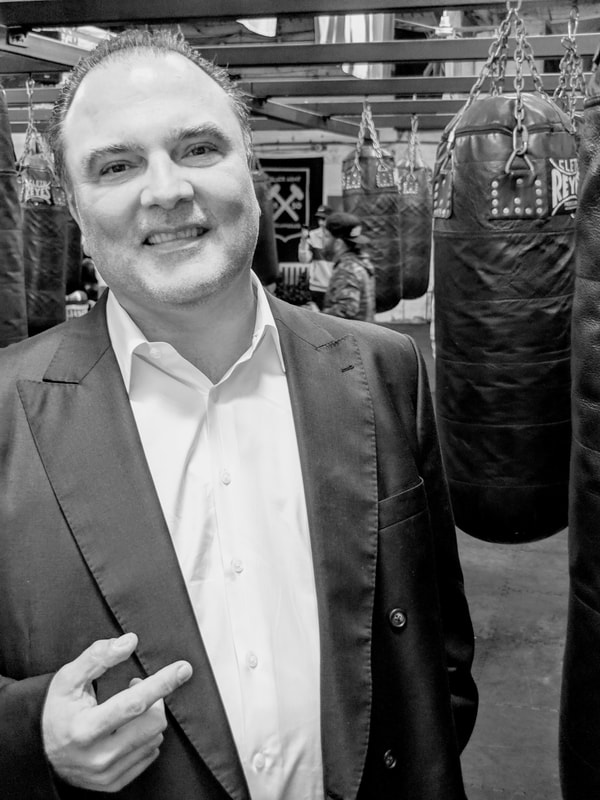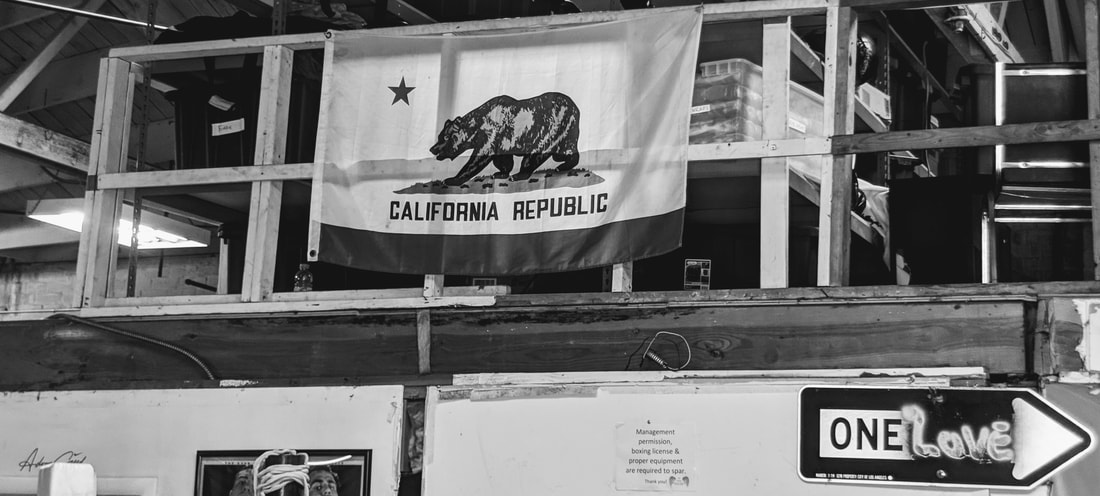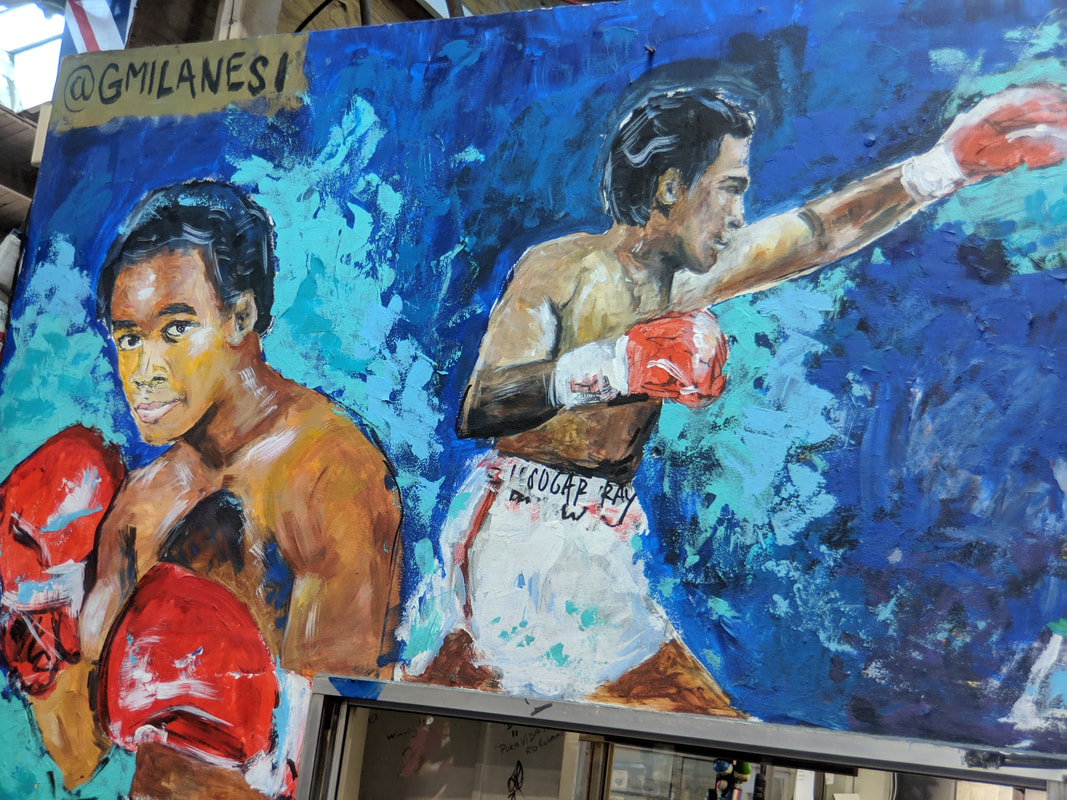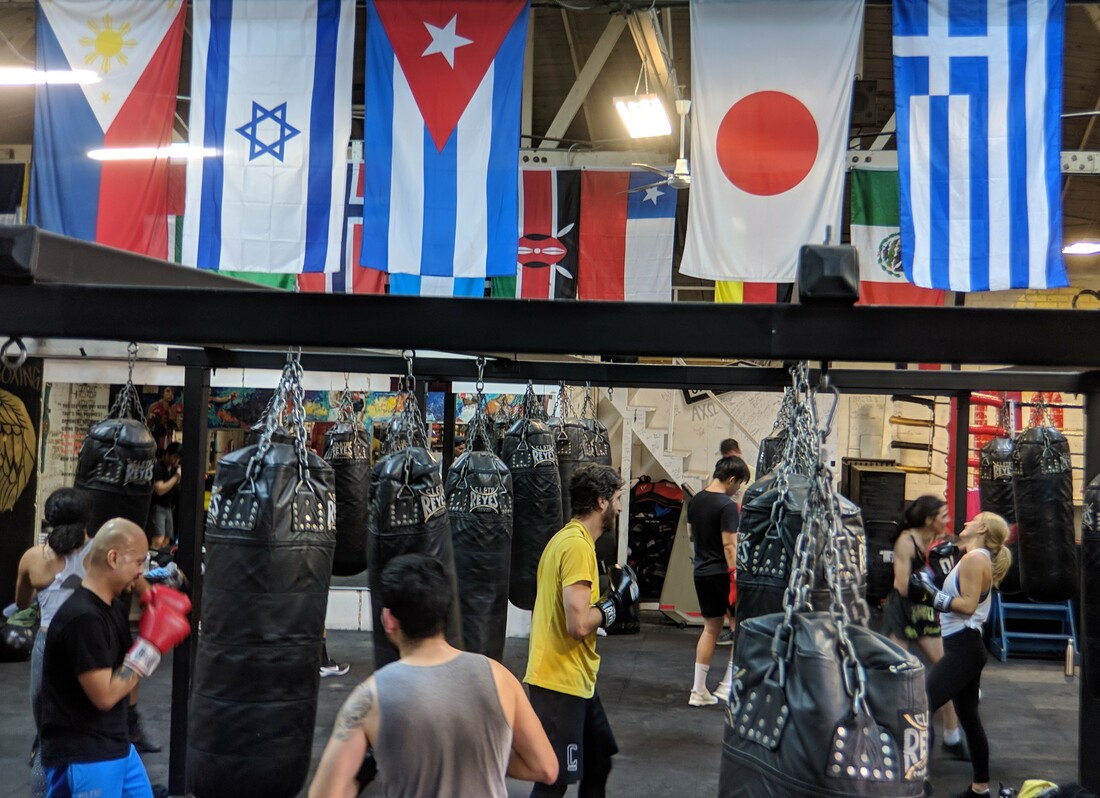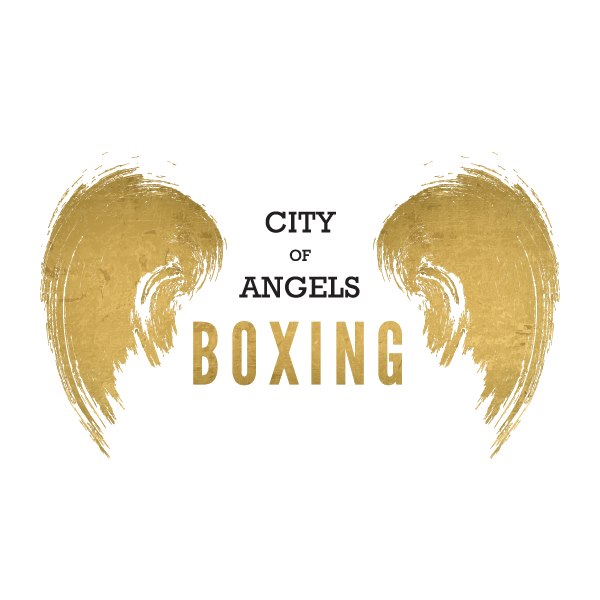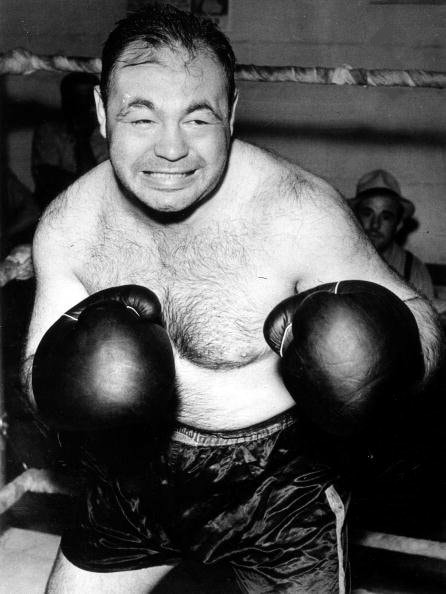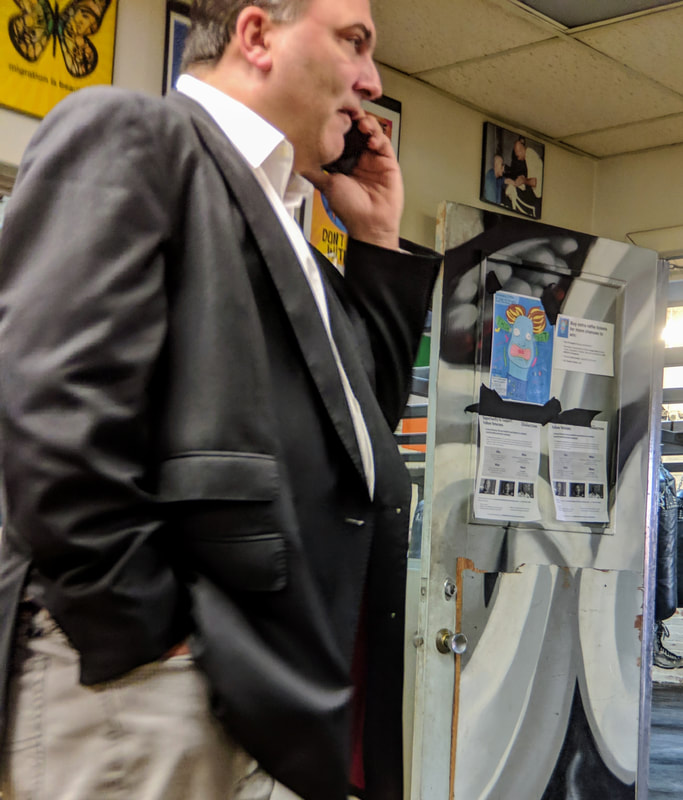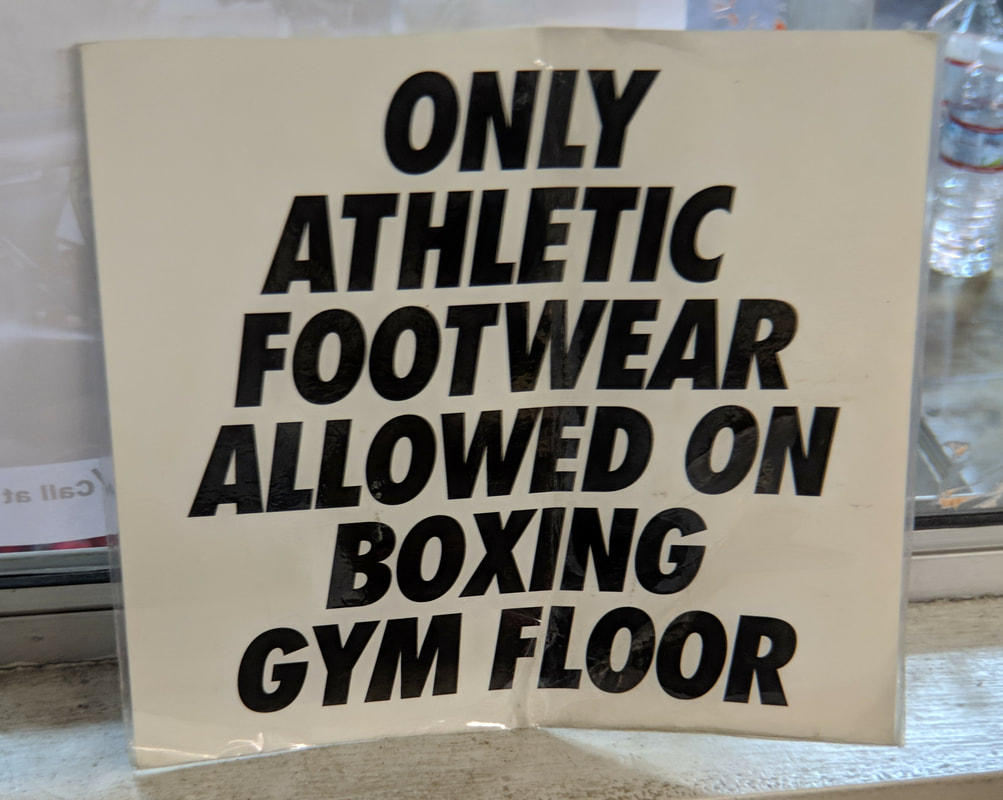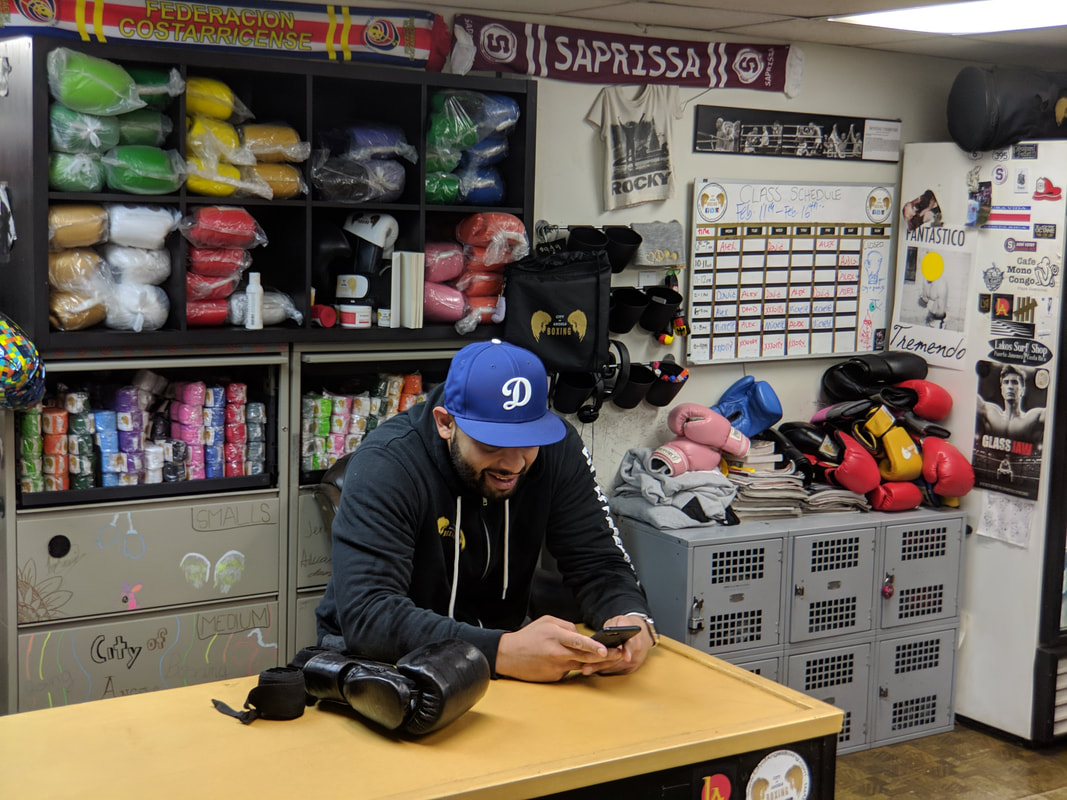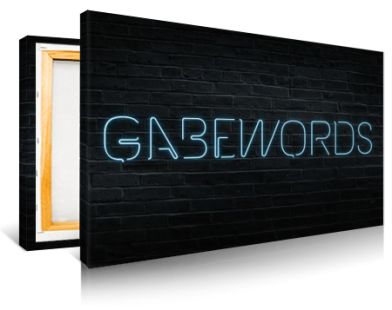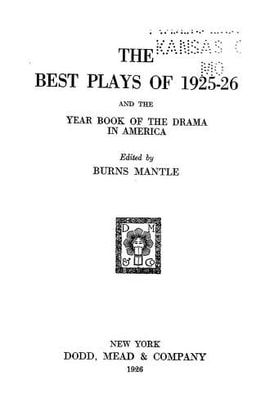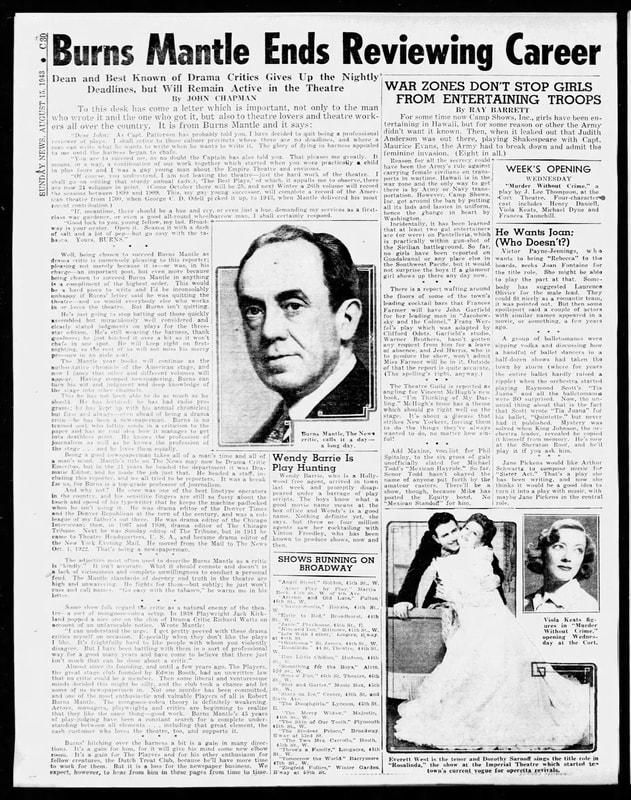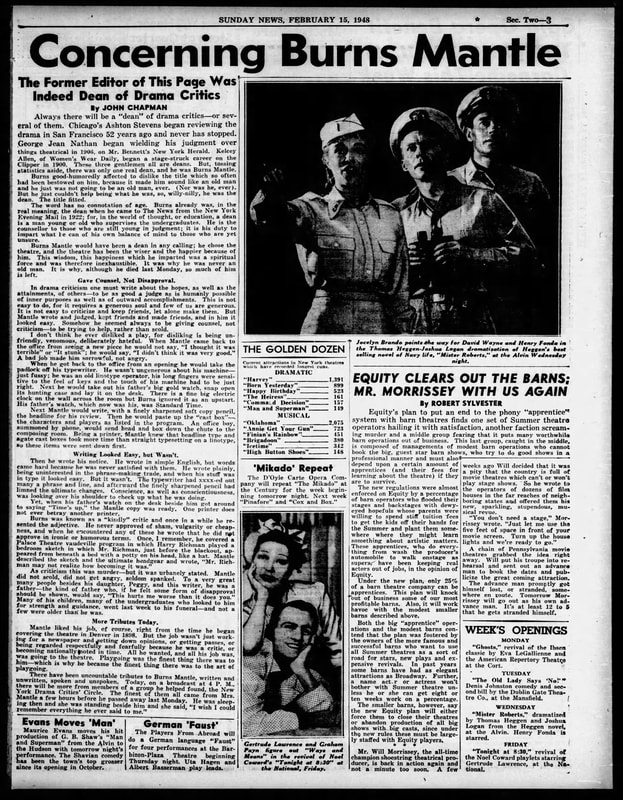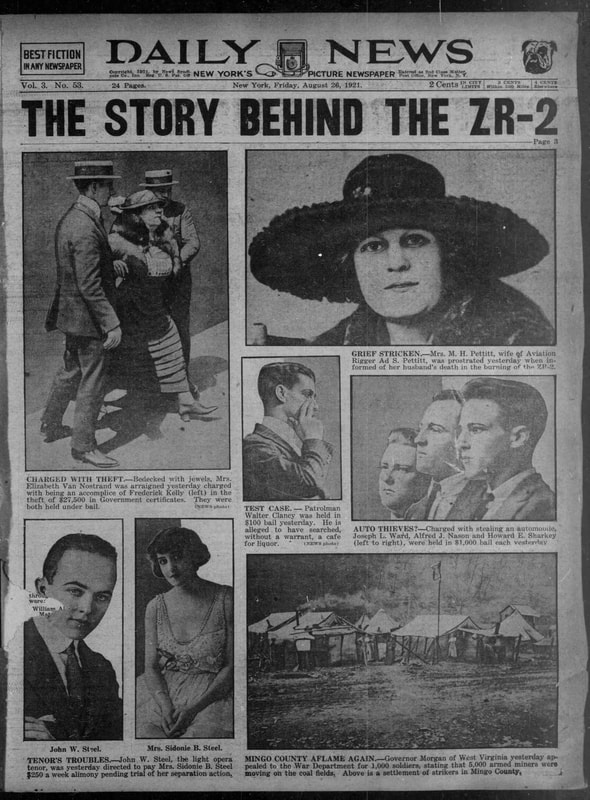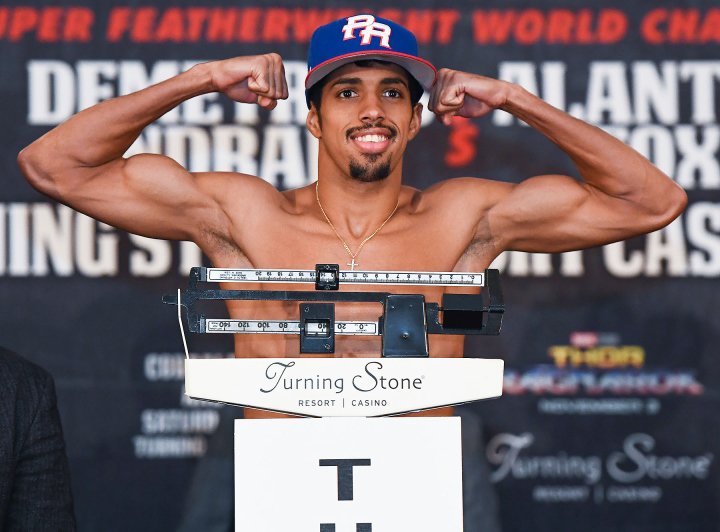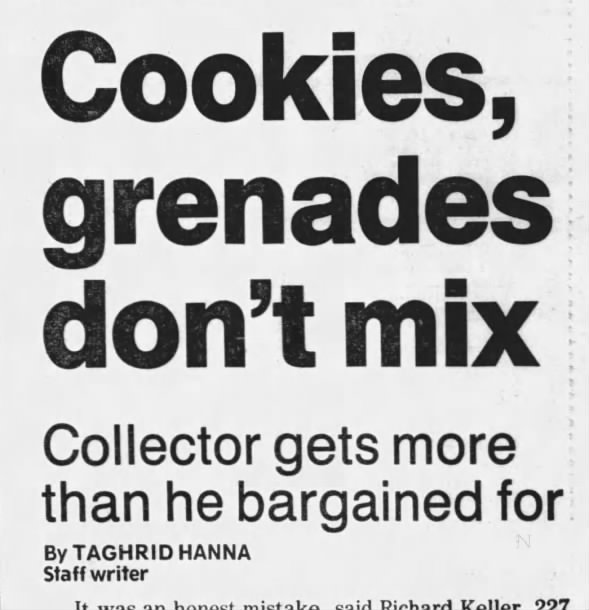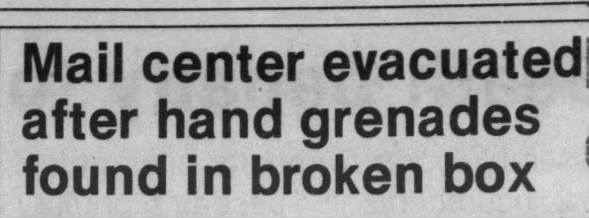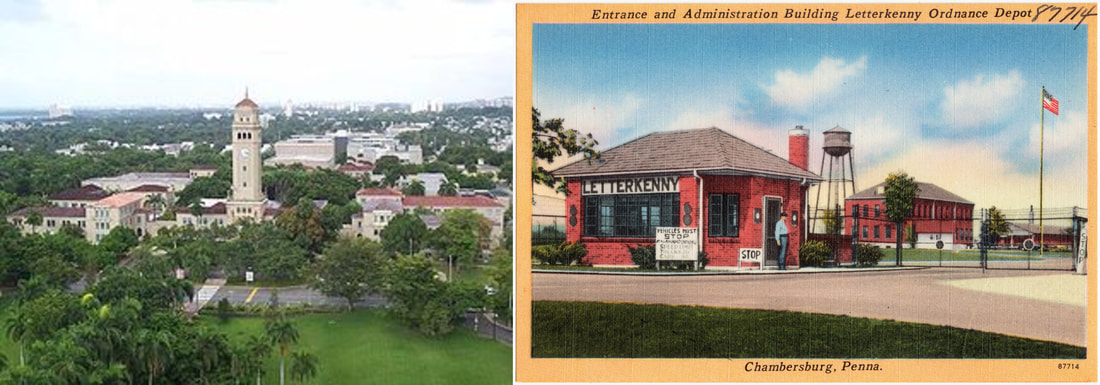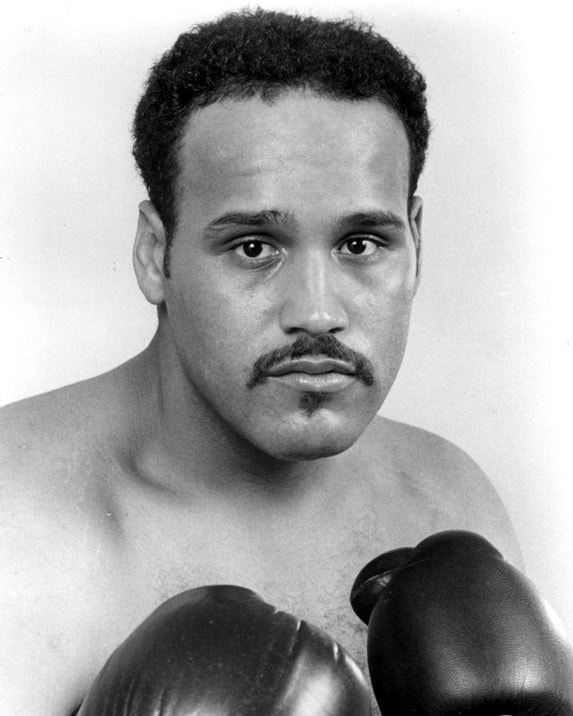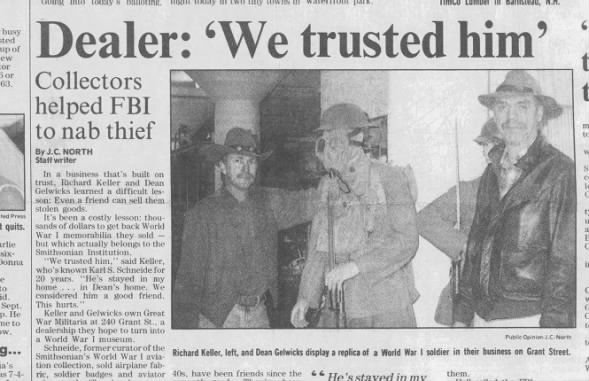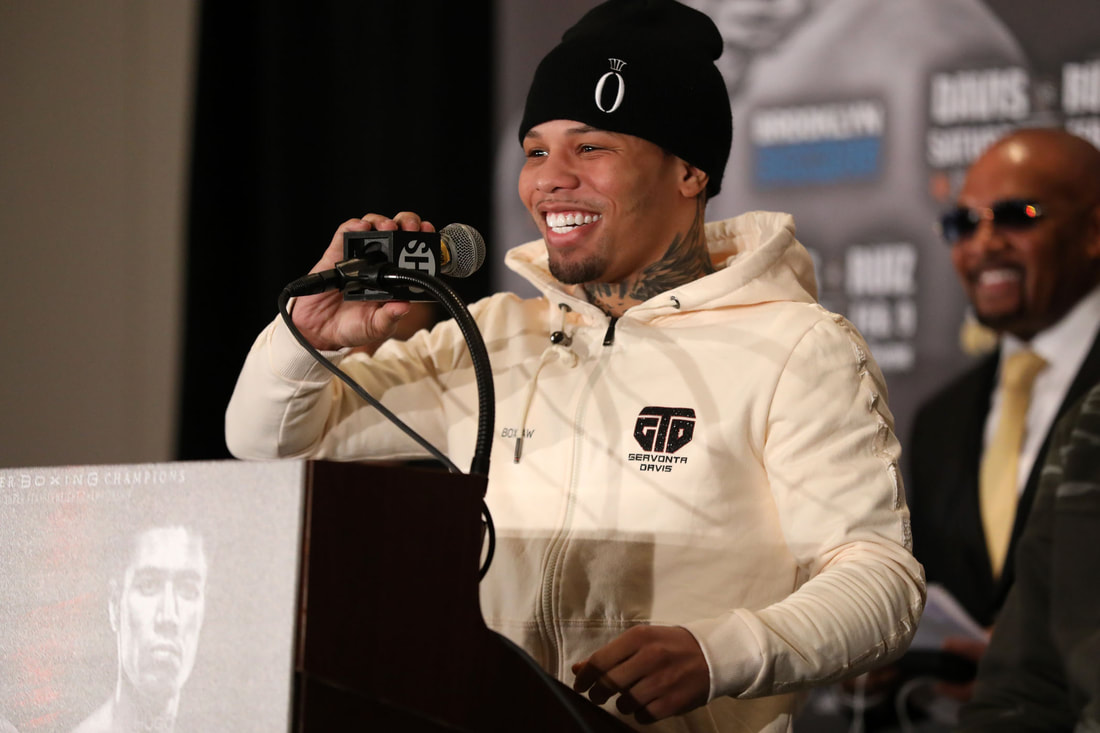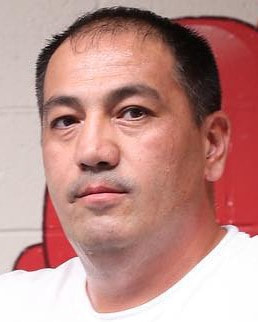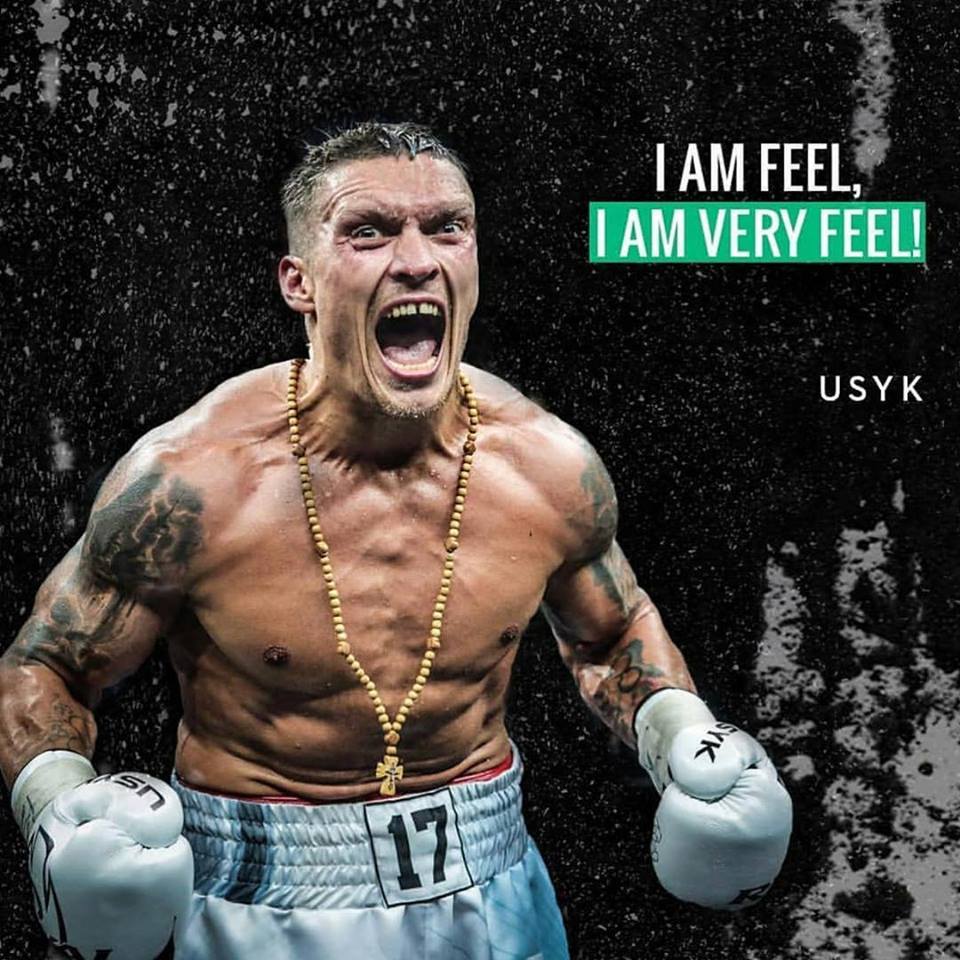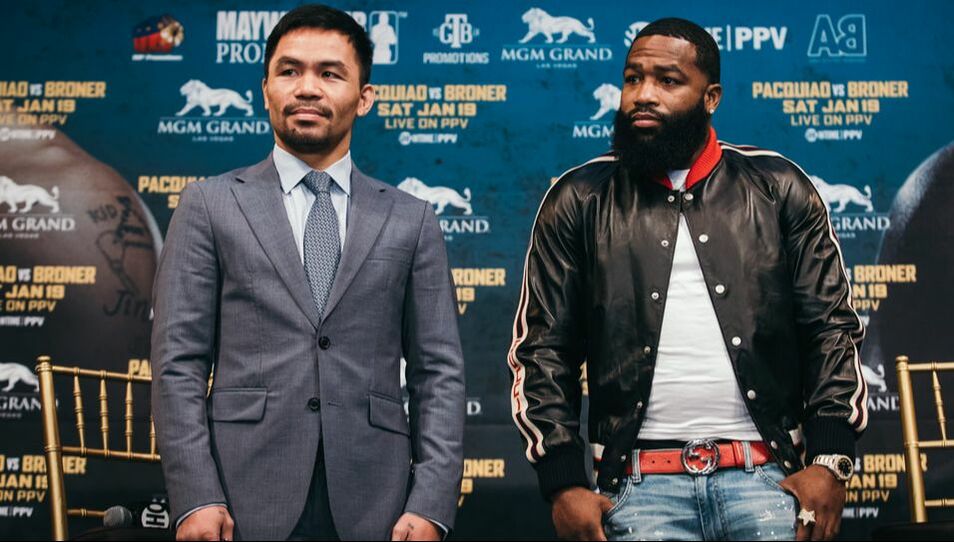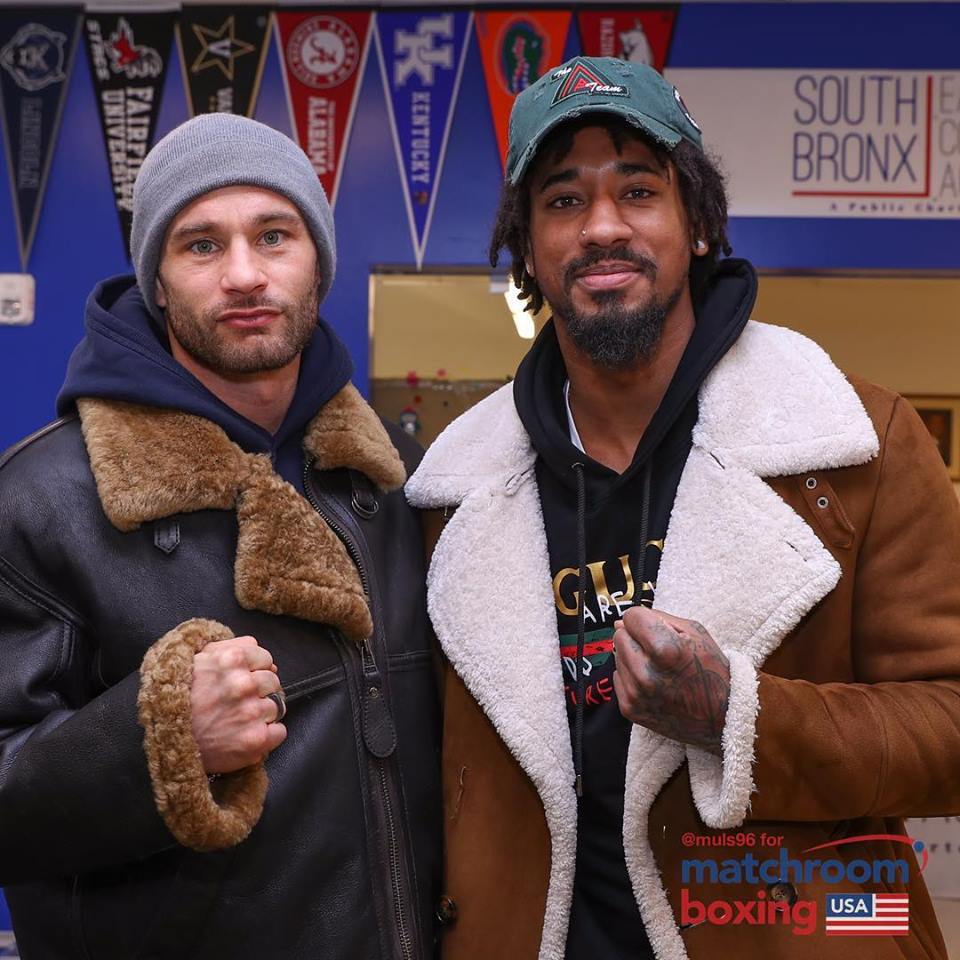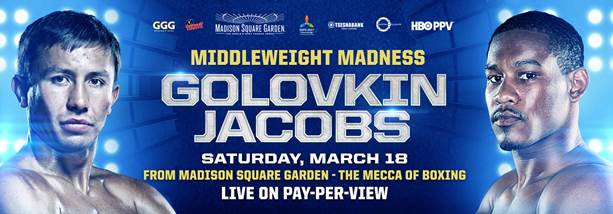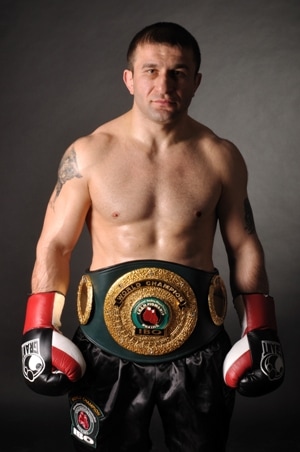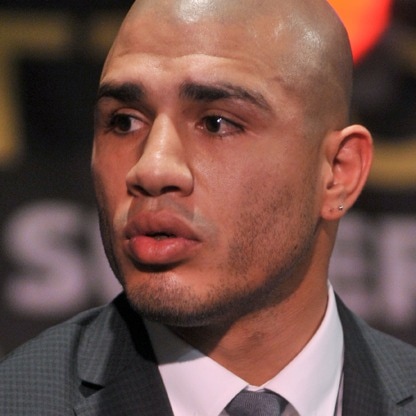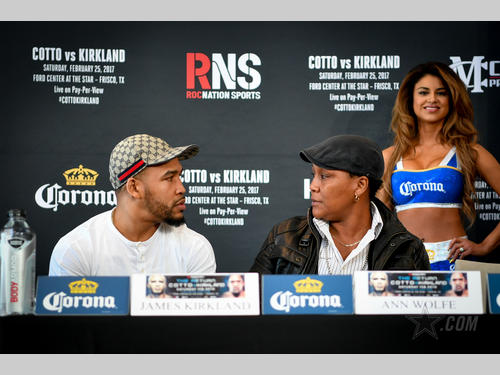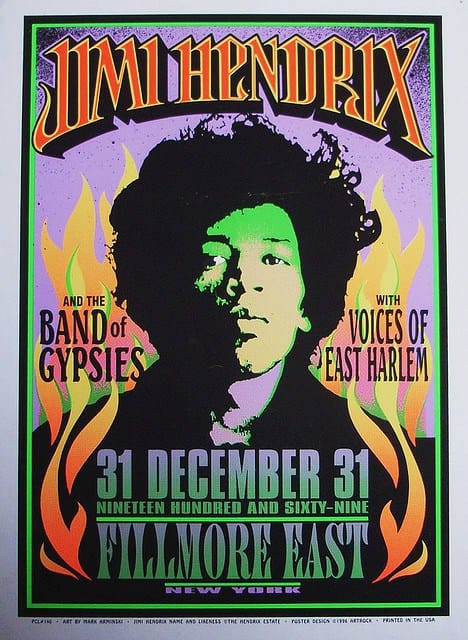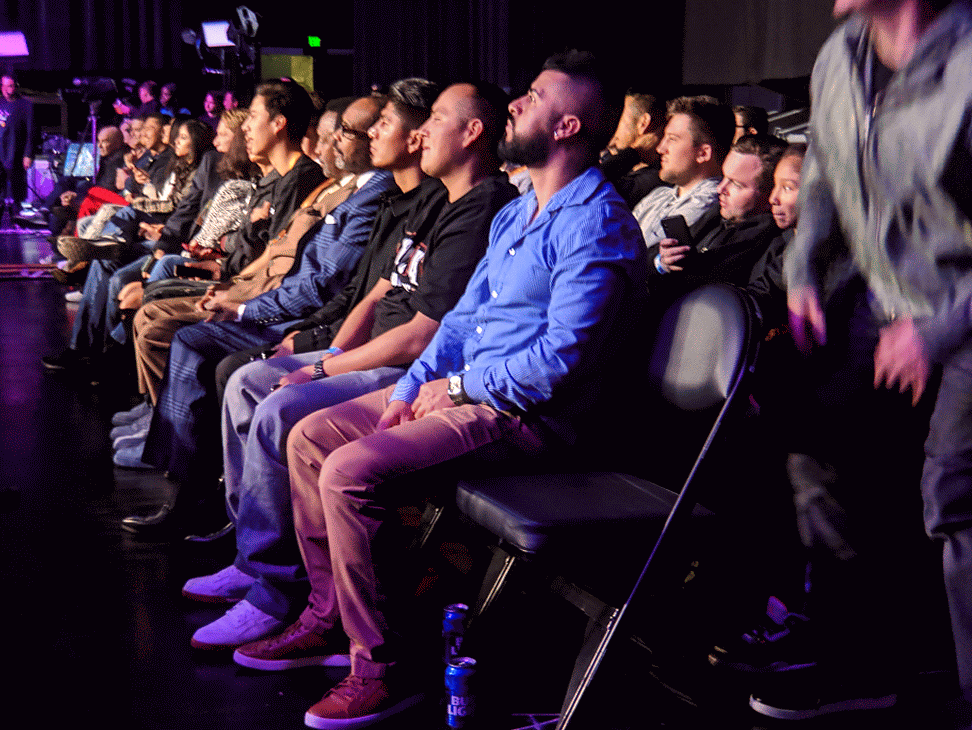 Mikey Garcia row reactions.... Iwasa Ryosuke (岩佐亮佑)岩佐亮佑岩佐亮佑岩佐亮佑 Iwasa was a tricky southpaw...whose feints would fade away for a small moment and who'd then become prey instead of a 強い predator. Figueroa on the left, Molina on the right What was this fight week like? Like this. Figueroa feinting, then coming with the up-jab -- which is then parried by a sharp Molina. Hugo Centeno -- Oscar winner for the best (side) part. What the lucky Fox broadcasters saw as they left, after three hours, with eight fights left for us non-television folk. 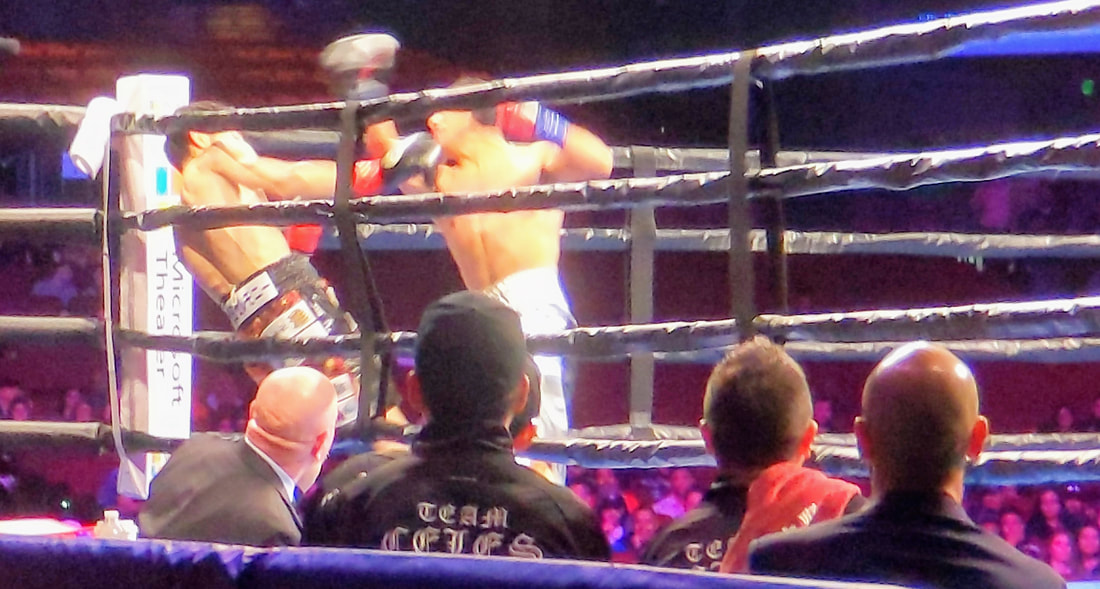 Iwasa backing into a corner...again. Cool story -- you know the brand Hollister? That's the locale in California where surfer dude -- just kidding; I mean boxing judge -- Steve Morrow lives. Morrow is the guy who had Iwasa winning 98-92 (Iwasa's manager thought he lost, and if he did win, that Hollister margin is as uncool as the current Abercrombie catalog (all about the '90s near-porno circulars). Enter Cesar Juarez, the man I believe was robbed, seen here winging an overhand left into Iwasa's ear. Iwasa's straight left splitting the Winky Wright earmuffs of Juarez. Okay, so the southpaw landed his money straight left -- why am I , then, giving judge Morrow grief? Because it was a powerless left. He'd push it through the guard but there was no snap action -- it almost seemed like he was wearing '80s aerobic wrist weights to slow his own hands down -- like he knew the 4K camera was broken and was providing slo-motion in real-time free of charge. Also of note: Mr. Too Cool to Watch (Plus He Has a Job) Security Man. Only we can do that to our pledges! Alright -- that blow might've knocked Juarez back some. Steve Morrow -- if registering this moment in time is cool... More Cape Cod Iwasa Iwasa. And we're the three best friends that anyone could have... Here comes an Iwasa upper-cut -- maybe that Steve Morrow is a genius. Iwasa was super straight-up all night, reminded me a lot of Takashi Miura. Dude has some admirably pronounced cheek bones. "But all I want for Christmas is this little puppy -- pleeeeaaaase?" "Pretend I'm Mayorga and let's see what happens..." Juarez goes low for leverage and Iwasa presses him down -- happened repeatedly and irked Jack Reiss, the former fireman who can get you the house of your dreams as a realtor. According to one person involved in this promotion, I was Shaqtin' a Fool on Twitter. Is it possible I was just very hungry? Kenny: Are you gonna stay the whole night, even after the Fox broadcast ends, till the Marlon Tapales KO at 3 am on the East Coast? Errol: I dunno... Hitman: I put in 8 minutes versus Hagler. Ain't got more to give. Derrick James: Hell, no, mothereffer -- are you outta your damn mind? When neither guy was tired, and they weren't leaning on each other, there was some great pocket-pivoting action. Both guys changing levels with their knees. "Spread out!" And this here is why -- despite all the evidence you've already seen above -- I believe Iwasa lost to Juarez. He would have some success in the middle of the ring, but if Juarez wanted the guy fighting for his life on the ropes, Iwasa voluntarily gave up ground and let himself be shoved baby-style in the corner. Then he'd get battered some. Look, it's a classic question -- do you give more credit for the sallies at the center of the ring, which have a certain attraction, sure, or the pressure work of the come-forward fella? Juarez wasn't just an aggressor -- he was an effective one, dictating the spacing of the thing (or Iwasa wrongly thought he knew how to box off the back foot -- either way). Iwasa had no idea, once pinned in the corner, how to respond with clean boxing, so he clinched, pressed down on Juarez's neck, built a stupid, expensive unnecessary wall by stealing money from the military. This is why Jack Reiss -- actually -- warned him and his corner constantly about clinching, neck-pressing, operating a commercial vehicle under the very low arched overpasses of the Henry Hutchinson Parkway. Oh, and headbutting -- Reiss warned Iwasa about leading with his head - - which he does above blatantly -- not because he's a dirty fight, I don't think, but because he knew he had to slip punches , and his defensive idea of dipping is this telegraphed turtle nonsense. In the end, it comes back to the star on the marquee -- the headliner -- featherweight champ Leo Santa Cruz. I took this photo Thursday; I love it because it captures the purity and associated appeal of Leo's smile. It's genuine, radiant and very inviting. Unless we've all been conned, he's the most guileless person in the sport -- just look at how empty the Conga Room at LA Live is in this photo. Leo isn't flashing bleached whites to dupe the media or ingratiate himself with the public. This is a small moment that would have otherwise gone uncaptured by me, had I not walked by just as he broke into a grin. The sad thing is that while the grin and heart are real they're also there in spite of his father's cancer weighing on his soul. I heard again tonight from someone on the stage at the Microsoft Theater: Leo didn't look particularly good (he landed some vicious liver shots I have no idea how Rivera took -- and Rivera landed his own torso attack), Leo couldn't put this guy away, he took shots, maybe he was distracted by his dad's protracted battle with the disease again. The person talking was well-informed generally but not in this case's particulars (Leo is also bashful and private). So this was more speculation than wink-wink assertion, I believe. And that's a shame. A shame we can't evaluate Leo outside of the context of his suffering inside from of his father's diagnosis. Maybe it had no effect last night. But no one can say but Leo. He deserves to have fewer worries -- and to be evaluated on his own terms. I hope he one day is -- and soon. Speaking of fathers, I had Vampire Weekend's "Harmony Hall" playing in my head all weekend -- the first real track off the band's long-anticipated new album, expected to come out this spring. Why? Because all week we've seen Leo's ailing dad , and the album's name is "Father of the Bride." And then because of this haunting refrain: "I don't wanna live like this, but I don't wanna die." The first time a Richard Schaefer appeared in the press to defend a highly controversial, perhaps unethical, industry-shaking move was in 1984. Schaefer was a spokesman for Loma Linda University Medical Center, and his task was to explain to the press the death of a 20-day-old baby born with a congenital heart defect -- which was deemed terminal immediately -- who received a heart transplant from a baboon as a medical experiment (which experiment failed for the most simple reason: the doctors didn't match the blood types of the donor and patient). That Richard Schaefer isn't the boxing CEO who 30 years later allowed fighters to forgo signing with the company he ran and make deals instead with an outside adviser -- a corporate self-sabotage that resulted in his firing (but also, on a theoretical level, differs little from airlines leasing Boeing or Airbus models from third parties for their fleets, which is common practice). But in combing through the archives I found that first tale so bizarre and upsetting, like a "Ripley's Believe It or Not" comic crossed with a History channel show on the Medieval medical practices of the alien architects of Stonehenge -- despite this having occurred in a decade when I was alive and in California of all states -- I had to include it. WTF? I am ashamed by the sensationalistic impulse that impelled me but not enough to change course. _____________ If you're reading this, you probably know already the details of the fight game's far different Richard Schaefer story. The way an addled and then rehabbing Oscar overlooked details at Golden Boy Promotions, how Schaefer, the former Swiss banker Oscar recruited to lead the crew, aligned himself with concert impresario Al Haymon to create a new, contractually-untethered boxing stable of estimable scrappers. And how Schaefer was then terminated for this perceived betrayal, which ending came with a negotiation barring Schaefer from working in the sport till 2015 (according to him; others have reported the non-compete clause expired later). What is less known is what Schaefer has done since that upheaval. Even if you've heard of his promotional operation, Ringstar Sports, which he founded in 2016 with the signing of top amateurs who'd competed in the Rio Olympics, I doubt you've seen coverage of his talent collection as a whole. And it is quite an assemblage of talent, from Alabama middleweight Money Powell, IV to Lithuanian welterweight Eimantas Stanionis (who's supposedly giving Cuban former champ Erislandy Lara all he can handle in sparring in Houston these days). Those names may sound odd to your ears now -- it gets more complicated: he has a beastly Nigerian heavyweight whose first name is "Efe" and an imposing cruiserweight whose first name is also "Efe," but in this case, it's short for "Efetobor" -- but they'll be performing theatrics on YouTube clips aplenty pretty soon. People talk about the Top Rank or Golden Boy or Matchroom stable. Ringstar is overlooked -- partly because it's presumed to be so totally subordinate to Al Haymon's PBC as to be unworthy of a separate inspection, and partly because it's a stable made up of kids who aren't yet contenders let alone champions (though they all could be one day). The former issue could be easily remedied, if Schaefer ever put on event of his own to showcase his signed talent, who are instead now the fodder of PBC undercards. I asked Schaefer if he has a contract with Al that forbids independent shows, and he said no. Even without a contract, you sense Schaefer wouldn't put on an indie show out of fear Al might not let him nominally promote PBC guys anymore. From what I can tell, the men are very close except when they're very not. Which suggests just how little we actually know about one of the most-prospect-laden fight firms we've seen recently (certainly, Ringstar is the most international and diversified group of potential kings yet assembled). As Saturday's fight card (to be broadcast live from LA by Fox) is nominally promoted by Schaefer, this week seemed as good a time as any to sit down -- in a gym -- with the man whose divisive move a half-decade ago changed the business of boxing more than any other this century (arguably, Todd DuBoef's abandonment of HBO for Top Rank's ESPN deal shares that billing -- or some of Floyd and Al's machinations). Enter Richard and Gabe in a SoCal grindhouse. I sit down beside Schaefer on a cushioned bench (really, a love seat, if we're gonna be unfortunately precise in our furniture descriptions) in the office inside City of Angels Boxing Club, during the undercard media workouts for Saturday's Santa Cruz-Rivera event. Don't ask me what part of LA this is -- it's a Lyft ride away from the 'hood I had formerly been traversing, this new one more bedraggled but filled with more bodegas (#Desus&Mero). A highway was involved. For further details, please consult "The Californians." Schaefer is wearing a white shirt, unbuttoned at the top and a dark, piqued lapel blazer. Beautiful suede loafers with a horsebit and fringes. There's a comforting aspect to the luxury -- and to his paunch and hairline -- the former never imperiling the buttons on his placket, the latter more receded than the Greek economy anytime you open the paper. He's a human leather club chair, broken in just enough. A 21-jewel Swiss watch movement whose oiled gears still keep fairly precise time. He greets me with a long time no see, asks me about living in New York City. I start in with the one question I have for him, which I will ask repeatedly in various forms, for the next half-hour. _________________ It began with a chilly LA weekend (so 50s Fahrenheit) in December 2016. By Schaefer's gracious invitation, I attended a fancy-pants dinner at downtown restaurant Drago with boxers, publicists and beat writers -- and those hustlers in the game whose jobs defy description (#WatsonShoutout). The dinner was both a holiday party and a coming out event for Schaefer's new enterprise, Ringstar Sports. Some of his signees -- callow, dimply Olympians -- were in attendance, if I recall correctly, but stayed on the side, at their table, too shy to mingle. Whereas fellow diner Deontay Wilder shouted "bombzquad!" so loudly and suddenly I legit thought SWAT was descending on us (it turned out fine -- Wilder asked me as we were walking out together where I copped my LA Gear reissue sneaks, which flattered the hell out of me. And we're actually about an inch apart in height and I've got thirty pounds on him, and looking him straight in the face to talk kicks-collecting was mesmerizing -- I should never be on the same level, even if it's just eye-level, as the heavyweight champ of the world -- or any semi-serious challenger, minus the human wheelbarrow -- "Two Ton" Tony Galento, seen below, on one of his better days. But the highlight of the dinner was the presence of Mikey Garcia. He hopped table to table, talking about real estate-investing and wanting to fight Lomachenko and Linares (I've still found it odd that he said it with such conviction and has since decided upon other bouts -- did Al try to keep him in-house? Was Errol such a tantalizing prospect to him? Respect to Mikey, but I've no idea how his current movements mesh with the plan he laid out that night). The talk at most of the tables once Mikey got up was about Schaefer's angling to sign Mikey. There had already been reports of informal discussions. His fluidity at that party, the way he owned the room -- it indicated Mikey's star wasn't at all diminished from the long break he had taken from the sport to get out of his Top Rank contract. And it seemed to confirm as well that Schaefer was about to scoop him up. Back to the present. I ask Richard, What about that night -- about going after Mikey? You didn't get him. You're 57 now. Do you really wanna shepherd kids from their pro debuts at 0-0 to the top? Yes, you have the sculpted, heavyweight Efe Ajagba -- managed by sharp-eyed-septuagenarian Shelly Finkel -- who'll challenge for a title if he can acquire even minimal skill relative to his maximal athleticism -- he was formerly a baker in his Native Nigeria, so he needs some time and tutelage. Sure, you signed US Olympian Karlos Balderas, the lightweight whose virtuosity in his run to the Rio quarterfinals led to a bidding war for his pro services (Schaefer tells me of beating out Bob Arum and Japanese promoter Akihiko Honda, proprietor of the famed Teiken gym and stable). Seemingly, star attractions both -- Efe and Karlos -- but in the future. Why start at the bottom again unless you had to? And the unspoken subtext to the question is industry scuttlebutt that Schaefer thought Al would give him a post running the PBC empire upon his legal return to the game. But rebuffed by Al, offered far less money than anticipated -- and only to organize individual events so Al doesn't fall afoul of the Muhammad Ali act barring managers from promoting; given no more money now than his east coast counterpart, Lou DiBella, who runs Al's shows in the Barclays Center -- Schaefer had no other choice but to seek new blood. So goes industry talk. Schaefer recites his very different version of history. First, boxing is divided into three leagues, he says -- ESPN-Top Rank, DAZN-Hearn-Golden Boy, and Fox-Showtime-PBC. "In order to attract fighters to these platforms, it has become a very distorted market. Today, more so than ever, truly big-name free agents don't really see the benefit of signing long-term deals with a promoter. "In a way, I fully understand them, and in a way, I frankly agree with them, too, because it's sort of the model that I built before, where I empowered Oscar De La Hoya to become his own man and take charge of his own destiny." If so, why are you promoting -- what do you add to the kids' careers that regular PBC fighters lack? But more on that in a moment. For now -- wouldn't it be easier if established stars signed with Ringstar? "It would be easier, but you look at Mikey -- Mikey's career is going extremely well, and I'm working now with the Spence-Mikey fight. It's gonna be my fourth fight I'm working with Mikey. We don't have a contract, but we work well together...With Spence, as well." To be clear, that's Schaefer saying Al has assigned him four Mikey fights, basically (not to degrade Schaefer, that's just the model). "Whether they're signed to me or not doesn't really make a difference. Because I've seen in boxing, sometimes just because you have a signed contract, it doesn't really mean anything... "Just to have a piece of paper, where it says, 'Oh, I'm the promoter -- it's nice to have, don't get me wrong. But in the end, it's not really where the sport is today." Okay, so let's talk about people who do have the piece of paper. Karlos, Lindolfo Delgado, Efe Ajagba. Unlike everyone else who works with Al, they do have a promoter, and it is you. So what do you do for them that they otherwise wouldn't get? "Take, for example, Joe Joyce, who is the silver medalist from the Rio Olympics -- super heavyweight. So I make sure that he's busy. I make sure he gets the right fights. I make sure he gets the right exposure. I speak up for him and push him in the media, as well. "I talk to the sanctioning organizations to make sure they don't forget about him. And so I basically, help build his image. That's what I really do. Joe Joyce -- now he's ranked number five in the world, WBA." Schaefer then adds Joyce will be fighting for a WBA "regular" heavyweight title in a half-year and a more legitimate title six months after that. At this point, his answers seem somewhat contradictory-- are the guys in the PBC so super-famous like Floyd that they don't need a booster? And his listed duties don't seem uniquely helpful. But later multiple people will tell me how he singularly nurtures talented-but-impressionable future stars (I'm referred to the cases of Danny Garcia, Abner Mares and a few others-- a whole roster of men who were once kids who could punch but mistrusted everyone besides Richard Schaefer). Moreover, what Schaefer omits here only to mention it later is that he provides real financial support. You'd be surprised at how much Haymon has given his charges not for fighting and not out of contractual obligation but for unforeseen domestic expenses, including illnesses and injuries. For emergencies. Haymon has acted as the insurance and benefits that boxers have historically been denied. Schaefer has given his kids signing bonuses and, at much greater expense, he's padded their early career purses, so they can make mid-to-top level money far earlier in their lives. He won't disclose a figure for these expenditures. He just says, "Millions." Because of politics, you can't play in all three leagues. Is it frustrating for you, because you do have young guys, and you wanna build them, that you're sort confined to one? (Translation: Is Al's hold on your dudes strictly necessary?) He says his fighters are too young to be seeking unifications with peers signed to Top Rank or Golden Boy. Suddenly sounding boastful, he acknowledges DAZN's investment but emphasizes its paltry subscriber roll. Whereas Fox, Haymon's broadcast home, is "where you're gonna have millions of people watching," he says. "This is the way you build a star." Just then, 12 minutes and 30 seconds even into our interview, his iPhone starts to ring and flash before our eyes. The caller is listed on the phone as "Al Haymon Cleveland." "So, um, let me take that quickly," Schaefer says. Schaefer is complex, competitive and kind enough to be able to woo boxers whom the world has psychologically harmed. I'm not sure even he knows where his personal beliefs end and the promotion of his product begins. Two boxing people plugged into the LA scene say ideally, Schaefer wanted a couple of stars but only in addition to the prospects because he's earnest about wanting to experience a new journey with the younger generation. Economics dictate the faster they rise the better for Schaefer: He projects Ringstar, which has been in the red since its founding, to remain so till 2021, and it's his money he's invested -- I've asked about equity partners and he's demurred and spoken of his own dough. Schaefer says he gets a call from a boxing manager every other day who wants Schaefer to sign his charge -- he estimates he's turned down 100 to 150 boxers. He'll only take on boxers with serious amateur pedigree (except for the heavyweights, whose physicality is valued equally, if not much more so, but only if they're conveyed by an experienced manager like Shelly Finkel, who has a piece of Deontay Wilder -- "Shelly Finkel has a tremendous eye for talent," Schaefer says). "If you really want to build somebody into a superstar, you can only do it for so many, because the day only has so many hours...This is year three, so I'm definitely on track. I would say I'm ahead of track, because now some of my fighters, especially in the in the super heavy division," are learning at an accelerated pace. In Schaefer's version of events, when he was allowed to return to boxing in August of 2015, he thought of how hard he had fought alongside Oscar to build Golden Boy and wondered whether he could ever top that.
He used the same analogy Wednesday with me with me that he gave to the New York Times 13 years ago -- I later found out via Google Search. He talked about how inspiring United Artists was to him -- the firm that Hollywood stars Mary Pickford and Charlie Chaplin, among others, founded in 1919 to take power back from the all-controlling studios. In Schaefer's telling in 2006 and then again Wednesdsay, he and Oscar had pulled off a similar move -- had wrested control from the exploitative Arums and gifted it to the pugs. He decided that summer, in 2015, he wouldn't try to top the feat. He says he began investing in real estate -- in a particular area of LA filled with Chinese immigrants. He didn't attend fights for a year -- avoiding the sport until, by his account, fans encouraged him to return. Others say he'd become hooked on seeing his name in papers during fight negotiations -- on being a public figure in a very flashy business. Now the lights were dark and it was unbearable. _____________ I asked Schaefer how he convinced amateur brats to sign with him after his absence. He says his reputation preceded him. "You can ask any boxer -- well, maybe with the exception of Oscar -- what they think about me. And you're not going to find one who has something negative to say, because I treat them right." He says boxing is a small world in which people talk -- to his benefit. A moment later his iPhone dings with a text message from Mike Coppinger, a Hoboken ex-pat contributor to The Ring, the LA Times, PBC on Fox shoulder programming, and scenes for an erotic film scenario Jeff Bezos commissioned on the DL for no discernible purpose at the time -- and who'll be my boy till the end (but please return my Facebook Messages -- it's not my fault I can't make dinner on one particular night #MuchLove). Schaefer says he has no hard feelings toward Oscar, though he recognizes the reverse isn't true. Maybe when Oscar's a little older, they'll reconnect, he muses as we stand near a sparring ring, having left the office. What's funny and also not: Oscar's hard feelings derive from Schaefer shifting certain fighters out of the Golden Boy fold. But Al Haymon -- not Schaefer -- has made the money off that cache. So much so that Schaefer has assembled a brand new team entirely -- composed of top-flight talent from non-traditional countries (he's got Frenchman Souleymane Cissokho, who was born in Dakar, Senegal and won a bronze at the Rio Olympics, to cite just one more example). "My guys aren't gonna be babied," Schaefer says. "They are the best." And he didn't merely out-spend the competition -- he might have out-thought them. Schaefer didn't fly down to Rio, but he paid for a scout to be his eyes down there. "It cost me a lot of money, but I have great scouts." He figures he actually saved money by recruiting the new breed of amateurs, those who come into the big-time with enough experience to challenge for titles relatively quickly. More moneyball: He claims to have foreseen, with Finkel's help, the rise again of the heavyweights toward the end of Wlad Klitschko's uneventful reign, which is why he signed three heavyweights from the Rio games. The division is abuzz again. Schaefer calls the pre-boxing, baking Ajagba a "sleeping giant." And you're sure you don't want your guys to step out of Al's long PBC shadow? "If my son would be a fighter, there's only one guy I would wanna have him sign with, and that's Al Haymon." Pause. "Of course, when I say, 'Al,' I mean Shelly, as well." I almost wonder why you made your own thing. You didn't leave -- you just branched off a little.Was it your choice? "It was absolutely my choice...I wanted to do something different." Schaefer says he talks to his friend Al everyday, that if you work with people you trust, you don't need contracts, so he doiesn't have one with Al now and he never had one with Mayweather. "Who knows what the future holds, but for right now, I'm very happy to be aligned with the PBC brand." ___________ The night after Schaefer's Ringstar dinner -- the one attended by Deontay and Mikey -- in December 2016, after which Deontay asked me where I got my sneakers, Schaefer was the nominal promoter of a PBC card held on the campus of USC. A Philly fighter -- Julian Williams -- whose fortunes I cared about more than a real journalist should -- was KO'd brutally by a Charlo twin. Afterward, during a press conference orchestrated by Schaefer, he stood talking at the podium in a way I didn't like. I think he expressed a sympathy for Julian that came off as entirely contrived. I recall asking the reporter behind me whether he believed Schaefer really cared or he was just going through the motions in a kind of greasy, unfeeling way. The guy didn't want to speak, but he nodded his head after the second option. It had been a very long weekend for Richard Schaefer, and I loved the guy who'd been decked -- perhaps I was asking way too much of an MC more frazzled than unctuous. Maybe the rise of the Charlos boded better for the PBC than a possible win by my J-Rock. Never in my life did I set out to write about intra-sport squabbles of a petty and political nature. But this is where we are. It's gotta be hard for him, I was told about Richard for this piece, to be a cog in the system he invented. Trust, betrayal, Efe Ajagba -- this feels more like the stuff of a series on Starz than that of non-scripted sports. But Saturday's Ringstar-presented PBC showwill be televised nationally on an actual network. This soap opera is live, in color and more extemporaneous than Dorothy Michaels' dialogue (#Tootsie). _________ After 30 seated minutes, Schaefer and I lean against a wall. We talk off the record about our families. The gist is that if people in boxing knew about the personal lives of other people in boxing, the divisions would come down. Al Haymon is notoriously private. But it's a mistake to take his silence for apathy or skulduggery. Or to assume there isn't serious heart at the center of a lot of his moves (many of which are kept hidden from the public themselves). Someone in the game asked me Wednesday whether I liked Richard Schaefer. Yeah, I like him, I said. I dunno that I trust him, but I really like him. There are no absolute saints or sinners here -- just a lot of people compromised by frailties common to the human race and endemic to the world of commercialized fighting. On the plus side, these new TV and streaming deals mean all these subjects have a chance to start over. No, old wounds won't disappear. But boxing believes in more second chances than the refs at the rigged 1972 US-USSR Olympic basketball final. Let me ask you something, Richard, I say to him before leaving the gym. How in the hell is it that I can find myself siding with you and with Oscar -- being on both sides? That can't make sense. No, it could, Schaefer says. ____________ This is supposed to be just part one of a two-part series on Ringstar's talent. I was gonna profile the pugs more deeply in the second go and maybe still will if I sleep for a couple of days first. That Richard Schaefer has amassed such a group -- so varied in background and so uniform in pedigree and credentials -- is an achievement to be noted. I hope he makes the absolute most of the group's collective opportunity -- so long as that happens, the platform's irrelevant to me. ______________ In another part of that same New York Times article in which Schaefer referenced the renegade actors, Pickford and Chaplin, taking equity back they believed they'd earned, Bernard Hopkins, one of the best middleweights of all time, who defeated Oscar before becoming his partner in Golden Boy, tells the writer during one phone conversation: "Our biggest test is to not become those who we have despised." It's foreboding and brilliant, even if it should be "whom." If I can be said to have two homes, they're New York and Philly, and on this day, the former inspires in me a nostalgia for times I never fully experienced, a minor sadness I can shrug off, a relief born of a larger terror averted -- whereas the latter has shaken me up in the here and now without any of the ease granted by the passage of years -- or a stroke of luck. ____________ Philly: I spent a good deal of college not on campus but in the converted warehouse now called 2300 Arena. I've seen guys fold up and crumble, like moths-turned-to-powder by a closed fist. Those were years complicated by ill-health and a tremendous confusion about what had happened to the person I once thought myself to be. I don't jump at every chance to return. I skipped last night's card at 2300 -- I figured headlining bantamweight Christian Carto would win without much of a trial anyway. At 3 am today, I read the write-up of John DiSanto -- the man whose web site on the city's boxing history was bible and textbook to me, whose presence ringside remains a tremendous comfort, especially if we have occasion to discuss old films. "The stunned South Philly crowd went silent," he wrote. Fuck. I turned belatedly to the Facebook broadcast, which proved eerie watching. In the first round, Woodsy -- kind, big-hearted Michael Woods on the mic -- noted Carto's risk-taking by refusing the offers of national promoters -- by betting he'd receive better ones in time. "You're sacrificing some safety...It's a gambling play. I like it." Two minutes into the second: It was silly how Carto got caught -- how with one punch his Top Rank dream might've been trashed -- not that I blame him. That would be fair but brutal. Unfeeling. This was KO-as-cold-existential-reminder -- we're all a misstep away from the edge. Dude was facing a southpaw -- and he overthrew, inadvertently twisting into a lefty stance. Rather than switch back with caution, he attempted the reverse of his feet and weight as if alone, in front of a bedroom mirror, with no one present to disrupt him. Carto had half-completed the change and was squared-up when foe Victor Ruiz dispensed the universe's harsh, inflexible judgment. A left to a kid not positioned to evade it. Man down. Night over. Promotional deal almost definitely withdrawn. Life...altered. When you're made to pay for a single slip, that's not justice (where's the court's clemency -- its compassion?). This game we play may be more electric for being absolutely unforgiving -- but don't tell me that when the kid is in my psychic corner -- or, really, vice-versa. It is about Carto. And he can come back. But there's a lamentation even in the way we phrase that -- to what dark corner has he been dispatched that we make his return so perilous-sounding? __________________ New York: This is a weekend of cognitive dissonance. Thin-skinned Kevin Durant went off on the media the other day for focusing on NBA free agency instead of its play. To me, it echoed complaints in other parts that everyone's a critic -- now more than ever, in large part due to social media. And we'd be better served as a society if far more people simply watched and listened -- observed -- reporters included. It's an argument I'm utterly sympathetic to, even if Kevin Durant is an unappealing petitioner (I once told the Yormark twin who runs RocNation Sports how Durant's move ruined the NBA, and his response was such weak doublespeak I feared he'd be enraged merely by seeing his own words printed -- not that such fear stopped me). Anyway, I wish I spent more time in deep observation and meditation myself. And yet this weekend especially, I long for more cacophony -- more criticism -- specifically from a semi-educated, always-painting-the-town-red press corps. I think of all the institutional memory erased by the myriad journalistic firings the past decade, particularly the way Tribune, owner of New York's Daily News tabloid, dispatched half that newsroom last July. The occasion is the anniversary today -- the 71st -- of the Feb. 9, 1948, death in Queens of then-renowned New Yorker Burns Mantle (actually, Robert Burns Mantle, in full, but he went by his middle name). The fact we all know about the Mick but you've never heard of his surname-predecessor on the city scene bespeaks the aforementioned loss of knowledge-and-ink-steeped rampaging article-oinkers. I'd bet a couple bucks -- I don't have more -- Tribune execs haven't a clue. Which is more than a shame -- if you're gonna destroy a place for economic reasons, shouldn't you at least learn who built it? Of course, in the real world, econ affords corporations neither the time nor rationale for such romantic study-- the sadness of that unavoidable fact is why "Up in the Air" was written, why capitalism will always have the whiff of evil such that its watchers can't help but promote modifications, if not outright replacement, despite all other systems seeming to suck worse. My aim is far less ambitious. To speak simply of a no-longer famous man. Burns Mantle was a drama critic, first in Denver in the 1890s, then in Chicago in the aughts, and, finally, starting in 1911, for New York City papers. He was the theater critic for the New York Daily News from 1922 until 1943, when, upon retiring, he passed this message onto his successor: "The glory of dying in harness appealed to me until the harness began to chafe." This long tenure isn't itself what made Mantle a folk hero to the Broadway bunch and general readers. It was that from 1920 until his death, he compiled a book every year of "The Best Plays." He began this endeavor in the same year Michelin released its first restaurant guide, 60 years before the first Zagat was edited and an eon before Google was even an idea. Oh, and ages before Yelp asked you to rate your nursery school, Burns Mantle had the novel idea of ranking plays on a four-star scale. For attending every opening night, for recording his impressions for the masses, he became an authority so beloved that upon his death from stomach cancer, the rival New York Times, in its deck (sub-headline), dubbed him the "Dean of Reviewers Here." Judge Mantle's words for yourself -- here's the lead from his article on the opening of Radio City Music Hall in 1932: "There is no describing this new Radio City Music Hall with superlatives. It is bigger than that." I came to know of Burns Mantle in a roundabout way -- no theater pun intended: His death, while not early for his era, came from a stomach cancer that recalled for me the moment I got the phone call a decade ago that my best childhood friend was now suffering from the same. I hadn't been in touch with the friend on a regular basis for years. I was, in fact, caught up in an internship at the Washington Post that involved an editor who outright said she didn't like having me around. But when a mutual buddy alerted me to this old pal's plight, I suddenly went numb to my surroundings -- everything was quiet or blurred to me but my own aching gut -- I felt immediately (and prematurely) the keen loss of someone I hadn't realized just how much I truly, without reservation, loved. I probably thought of my friend everyday for the rest of my time at the Post, which is to say, it preoccupied me, not that I was some incredibly faithful friend (I tried to be when I could, but we were in different cities, and he was being treated and often unable to have visitors anyway). It is sheer luck -- my own as much as his -- that my friend made it through that period, that the treatment worked, that I watched James Harden drop 48 on the Lakers with him last month, a decade later. It's no empty musing to think it could have gone another way -- maybe in a parallel universe in which the outcomes differ, Christian Carto never gets caught by a shot while switching. The margins are so thin in this life. So I feel some justice in roping Burns Mantle back in -- in giving him the posthumous column inches he ain't receiving elsewhere. We have nothing but each other. Yes, there's perhaps too great a degree of elevation here. To quote the opening line of 1932 Best Picture Oscar-winner "Grand Hotel": "People come. People go. Nothing ever happens." But there's tremendous hope, to me, in the idea I can snatch from history's dustbin scraps. Can show you that the Daily News's slogan long before the cuts came was "Best Fiction In Any Newspaper" and its earliest daily edition -- known as the bulldog among scoopsters and their readers -- featured an actual bulldog illustration in the top-righthand corner:
We all fall down eventually. Last night it was the unexpected and unfortunate turn of Christian Carto. He should get what help he needs to stand again. The best critics recognize their most soulful subjects, and having opened themselves to connection, wield words like outstretched hands, as a means of support.
On the day Puerto Rican super-featherweight strapholder Alberto Machado was born -- Sunday, Sept. 9, 1990 -- newspapers across America carried a most unusual story involving the fighting city of Philadelphia.
A day earlier, around 7 a.m., the contents of a postal service truck from New York City was being unloaded onto a conveyor belt in a bulk mail facility in Philly's northeast (#Rocky) when one box -- sent from France to an address in Chambersburg, PA -- fell off and split open. The disgorged contents? Some empty bottles, "military-style" leggings, a couple packages of cookies, a mess kit, and -- wait for it -- 19 grime-caked grenades and an artillery shell believed to date from World War I. Oh, and the munitions seemed to be live -- some of the grenades still had pins in them. As you might expect, the facility was immediately emptied -- workers were barred from the site for three hours -- and the vintage materiel was confiscated -- by hand -- by the Philly bomb squad, which set off the gunky goods in a controlled blast elsewhere ("a disposal site"). The leader of the bomb squad had the surname of "Garrison." The lieutenant -- Gene Zelcs -- who helped explain all this to the press so that it could even be mentioned in the papers on the day of Machado's birth was a native of a small Latvian town on the border with Russia who'd so assimilate the Philly way of life he'd write Eagles on his forehead in green marker on the day of their Super Bowl win in 2018 (#ImmigrantsForTheWin). How this cache of French fighting paraphernalia came to Philly in the first place remained a mystery only for a day or so. On the 10th, Machado's second day alive, a self-professed collector of Great War items stepped forward in Chambersburg to explain himself. Under the front-page headline "Cookies, grenades don't mix," in the Public Opinion newspaper of Chambersburg, Richard Keller said a French fellow collector was supposed to send him just non-incendiary goods -- he'd asked for the leggings and mess kit and biscuits -- but nothing more. "I'd be crazy" to do otherwise, he said, adding that in "France, they are used to that stuff (undetonated bombs) being scattered all over the place." Uh, yeah, right...sure. As the incident was being investigated by a slew of domestic authorities -- including the Bureau of Alcohol, Tobacco and Firearms -- Ronald Reagan was back in Germany examining what remained of the Berlin Wall he'd urged Gorbachev to tear down and Pizza Hut was opening its first two stores in the Soviet Union. Less known but retrospectively equally entertaining, given the crazy coincidence at play, was the simultaneous birth and neonatal nursing in Puerto Rico of Alberto Machado, the now 28-year-old boxing champ whose nickname I've heretofore intentionally omitted: "El Explosivo." He's ranked third at super-featherweight by Boxrec.com (although you could argue he could be first or second) and will take on the 44th-best man at the weight Saturday night in Indio, California (and live on DAZN). Of course, the bout promises to be a terrible mismatch -- one that won't help us at all sort who belongs atop the 130-lb. rankings -- same as the other super-featherweight scrap Saturday -- second-ranked Gervonta Davis against the dude designated 36th, in Carson, California (and on Showtime). Obviously, the most sensible match -- and therefore the one we ain't seeing -- would feature the two versus the three -- Davis-Machado -- not only for the hierarchical clarity it'd deliver but because Gervonta Davis, with his own nickname, so nicely suits this odd mail mishap narrative: "Tank."
Rio Piedras, Puerto Rico, on the left, where Machado was born, and the Letterkenny Army Depot, where would-be explosives-recipient Richard Keller worked.
Though the intersection of army, explosive and the Illadelph may be more artifice than must-know-info in this case, it recalls a man who really did unite all those things in a single story -- the late David Bey -- the '80s heavyweight who was Philly-born, took up boxing in the Army and was dubbed "Hand Grenade Hands" by the always-bombastic Don King. Bey, who challenged Larry Holmes for the title in '85 and is a member of the lost generation of heavyweights King pushed around rather than truly promote, passed away far too young in a construction accident two years ago -- he was working as a pile-driver -- at the age of 60. Career highlights: Bey knocked out Buster Douglas in his pro debut; defeated Greg Page in just his 14th fight (of course, King promoted both sides); and long before Adelson or Wynn erected anything resembling the Vegas Strip in Macau -- five years before Portugal turned over the peninsula to China -- Bey won his final fight there , by TKO, in 1994. Not incidentally, here's the NY Times' 2001 introduction of the area to its readership: "'I would never bring my children here,' said Ho Man-tong, a footloose Chinese businessman, as he emerged bleary-eyed from the blackjack tables in the Hotel Lisboa." RIP, Hand Grenade.
And now a return to the crazy war collectibles story for a no-less-strange post-script.
Richard Keller, the man to whom the artillery and cookies were sent, worked at Letterkenny at the time of Machado's birth and the above clippings -- a Pennsylvania facility that serviced US Army defense systems. By the middle of the '90s, though, he was retired from that gig and still amassing a collection of military gear-- his goal being the creation of a museum. In that effort, he wound up buying vintage goods from a man who turned out to be a thieving former curator of the Smithsonian's WW I aviation collection. You really can't make this shit up. The two Pennsylvania men ultimately helped the FBI track down the lying trickster, who was sentenced to six months in jail and ordered to pay a 20k fine. Meanwhile, if you wanna read a sad-yet-hopeful story on Tank's tough Baltimore childhood and his promise to Al Haymon not to eff up a promising career after a couple of unfortunate recent episodes, definitely check out the also-aptly-named Lance Pugmire's recent LA Times write-up. Courtesy of Mikey Williams/Top Rank If you don't wanna read more about the safest Storm in history and Kovalev's off-putting-but-excellent return, skip down to the fun Russian fight facts below. Otherwise: I wasn't entirely surprised by the Kovalev-Alvarez II result -- or at least, I wasn't by the last bell, if only because Sergey had by that point so forcefully reminded us he'd hided Alvarez once before that I already felt stupid for having picked against the racist man from the former USSR (although to be fair to nearly all oddsmakers, in crafting constant excuses for his lapses, Kovalev seemed to be prepping already for an inevitable new disappointment). Meanwhile, Alvarez showed us in Atlantic City and then again in the wee Sunday morning hours that -- minus well-timed counters -- he's a slightly bulkier Charlo brother -- he isn't nearly active enough to claim rounds, and his few sallies seem dinger-designed, as if the only punch worth throwing is the one that ends it all -- or, as he called his overhead counter heading into the first Kov-clash, "the macintosh." I picked Alvarez for two related reasons -- the rationales we all shared -- the first having less to do with him and more with Kovalev's mid-fight wobbles, Sergey's tendency to begin cratering in on himself like a poorly-made soufflé halfway through bouts, his heaving chest in the corner now collapsing, concave, his in-round huffing like the belabored breathing of a household chemicals substance-abuser. Or a mare in the midst of a difficult birth. And the second reason was merely an extension of the first: I figured Alvarez would land a few haymakers and they'd suffice. It never occurred to me he wouldn't throw enough of 'em or that Kov could stand up to a few solid ones - or that if Kov did, Alvarez would have no other resources at his disposal -- no way of tagging Sergey consistently as if he were 5 Pointz incarnate. After the fight, I suggested on Twitter that Top Rank match Kovalev with rising 168-lb. champ Zurdo Ramirez -- not because it's an obvious or sensible fight for the latter but because it's the opposite -- Ramirez in tough immediately at his new weight. I wanna see a callow kid face an old champ at a crossroads, and I don't wanna wait years. But more realistically: what about Top Rank pairing long-protected Zurdo with our feckless loser, Alvarez? Alvarez doesn't have the output to overwhelm Zurdo, it seems, and Ramirez could collect a big name at 175 immediately. I think the risk in that one matches up nicely with the potential reward. But no one has ever called me a matchmaker. Meanwhile, I am not convinced Kovalev is really back in any meaningful way. Any other top-5 opponent isn't gonna be outlanded by 450 punches. This victory elongated his career but may ultimately subject him to more cumulative career damage. _____________ Why the hell am I writing an article on my own site? Let's just say the home of my boxing work for the past two years, a company to which which I contributed a hell of a lot, is currently disinclined to reward that effort commensurately. Writers may be mostly powerless in the Internet age -- and I may be especially so, given my intermittent output/the fact that my brain's on fire. But I'll be damned if I'm gonna let anyone do me dirty based on those factors. So for this moment, at least, here I am. _____________ Remember that very recent phase when Kov was of the opinion that he needed a trainer who wouldn't tell him what to do, and he wound up, as a result, under the tutelage of Eastern bloc coach Abror Tursunpulatov -- as in, this guy? Well, Abror was working at the Ford Center last night, despite having been ditched by sunken-sternum Kov. Tursunpulatov also trains Main Events' young undefeated Chechen super-welterweight Bakhram Murtazaliev, who fought and won on the undercard (incidentally, it's crazy how much Main Events has riding on each of its few remaining pugs -- it's a small family company without the resources to buy free agents a la Al and Eddie, so these shot-in-the-dark unusual Eurasian Steppe suspects have to pan out). I think the boxing media has rightly shied away from asking Eastern fighters pointed political questions or connecting them in anyway with the election-interfering, destabilizing forces that have dominated our news for the last couple of years. Sport stars shouldn't have to answer for policies they've not penned nor had occasion to modify (under most circumstances). And boxing often requires a life lived in a vacuum, apart from worldly affairs of any kind. But sometimes such connections are hard to ignore, as I found after Abror started posting celebratory videos last night, hashtags included. Most of the social-media-mumbo-jumbo I understood, but what the hell was #Boxing911? I wondered. The short answer is that it's a big Russian boxing web site -- an Eastern alternative to BoxingScene or Fightnews or The Ring. But the better and longer answer is that it's the fun-loving fight reportage Borat would read if he were into bloodsport. If that reads slightly xenophobic, please understand that I am reveling in the gleefully foreign coverage -- it's like boxing cast through the prism of the Eurovision song contest (due to take place this year in Tel Aviv in May, by the way). I'm all for the polyglotism in pug matters (it's why tri-lingual Linares will always have a place in my cold heart). Take this video Boxing911 posted a month ago of cruiserweights Oleksander Usyk and Murat Gassiev dancing to techno: Or if these moves don't pique your Slavic interest, may I suggest a look at an English-language poster Boxing911 released of Usyk whose message seems to have been lost in translation (and of course, I'd sound totally idiotic if I tried to write in Russian)? It probably goes without saying that I want "feel" to catch on as badly as Gretchen wanted "fetch" to do the same. How's that heavyweight? Oh, he's feel. Very feel. I could spend hours diving more deeply into comrade combat culture (and the perils Murtazaliev is gonna face in the Western media if/when Chechnyan strongman -- and fight fan -- Ramzan Kadyrov takes real notice of him). But instead, let's show two Cold War movies some love -- because two titles come to my mind from 1967 that sum up last night's event (and anyway, I effing want to go there; film's a passion I'll maintain no matter how many "Alita: Battle Angel" sequels they make -- but please pray for our collective well-being the answer's none). The first has a title whose relation to Kov's career renaissance is too obvious (and speaking of obvious, how about "Storm Drain" as the backpage wood of a sportscentric tabloid today, Super Bowl be damned -- wouldn't that be nice): How good is the sea funeral cold-open from "You Only Live Twice," by the way? Easily one of my top-five opening sequences. This second film comes with a summary first -- so, spoiler alert, in case you still haven't caught in theaters "The Double Man," which featured Yul Brynner as a CIA agent whose 16-year-old son plunges down a ski run in the Alps, a fatal accident that Brynner doesn't deem one. Investigating, Brynner penetrates the Commies' mountain lodge -- a trap from which there seems no escape -- but escape he does, though the viewer isn't shown how. Soon, Brynner is telling a former British spy he plans on returning to the lodge and raiding it alone. It's a nonsensical move -- back-up is arriving, and Brynner -- whose sharp features -- #chrome dome -- my beloved paternal grandmother found attractive -- seems screwed. Only when Brynner does enter the bungalow we see two of him -- the Reds have performed extensive plastic surgery on a man so that he resembles Brynner perfectly. The real CIA agent never did escape the baddies' clutches the first go-round. And the impostor's raid was merely a public way of demonstrating that he's the real McCoy and no phony. It's obviously a farcical conceit -- akin to Julia Roberts pretending to be Julia Roberts in "Ocean's 12." But I also feel the story serves as a nice metaphor for Eleider Alvarez's putrid performance. When Alvarez KO'd Kovalev last fall, we believed he was the agent of that destruction. Turns out, an inauthentic Alvarez had appeared briefly, in part because Kovalev allowed him to. The real man was still a musclebound, low-volume puncher with a Ferris wheel radius on his overhead rights anyone with a sense of distance could avoid. Wasn't pretty. I'll take the fake any day. If there's anything I like as much as old films and primal, anachronistic combat, it's playing oldhead despite being in my 30s (I also wanna relive the year I was 23 -- at least those parts of it that went down in The Collective in the Meatpacking, before the location turned into Bagatelle -- but we can discuss my desire for a do-over decade another day; I will add, however, that one of my best experiences there involved convincing a Brazilian woman to let me join a party she was attending by naming most of the top-flight soccer clubs in her home country -- go Botafogo go!).
So after facing Oscar Valdez on ESPN last night, Italian non-stallion Carmine Tommasone proposed to his wife in the ring. Beautiful little moment after Tommasone's defeat -- but I've already seen it. Four years ago, I went to a Salita-promoted card at NYC's Webster Hall with a then-Wall Street Journal columnist. The fights stunk -- wasn't Dmitriy's fault --he didn't have the financial backers yet to own a stake in Big Baby or Claressa Shields. The WSJ writer split early. I stayed till the bitter end, a main event featuring a part-time pizza-maker named Floriano Pagliara -- a super-featherweight from Tuscany without power or speed who managed a win because his opposition was even worse. It was Pagliara's second-to-last fight. Afterward, he drew Stefania Fuselli into the ring and dropped to one knee. More amazing than her "yes" was the length of their relationship -- they'd been dating for 11 years. Equally notable: the very ominous (almost stereotypically sitcom-Italian) way Floriano characterized the long courtship: "We have spent happy moments, others stormy, especially in recent times." Perhaps he was alluding to his suspension in Italy for having taken a banned diuretic. In any event, ESPN's announcers last night wondered where Tommasone had the ring. Can't speak for him, but Pagliaria hid his in a baby carrier. As Tod Browning's directorial career proved, we're far more interested in sideshows & abnormalities than we'd like to let on -- which is to say, I understand the interest inherent in Pacquiao-Broner, which pits a man 10 years past his prime against a fighter at least 12 lbs above his best weight. (Incidentally, I think Browning's work was neither entirely exploitative nor reflective but some combination of the two -- the result of a limited talent and impatient industry crossed with Kurtz-esque curiosity.) What bothers me are industry hype people -- fellow writers included -- who'd paint this PPV as being more central to the sport's hierarchy than that. I don't want dilettantes thinking this PT Barnum event is akin to an actual box-off; just because we can't get Spence-Crawford-Thurman, the only 147 round-robin that matters, doesn't mean we should pretend anything else is a reasonable substitute. Mayweather-Pacquiao didn't hurt boxing because it sucked -- it hurt boxing because we promised the general public for years it wouldn't. So let's call Pac-Broner what it is: A freak fight -- made for freaks and featuring them -- sharing more in common with RJJ-Trinidad or Mayorga-Vargas than any recently-prominent welter PPVs. While I find Broner's staged self-absorption tiresome and Pacquiao's reincarnations exhausting in their own way (spunky Santos City-survivor to adulterer to religious zealot to dictator-dutiful politician, with some unnatural muscular growth along the way and the sudden unloosing of a sense of humor), I'm also curious as to what may happen once they're penned in together. I also buy Showtime pressing the package hard -- they've been screwed by the division of the PBC into parallel Fox & Showtime passageways -- screwed because they couldn't pay out enough to ensure Al-fidelity. So Haymon, who originally wanted to buy out the sport for the sake of UFC-ifcation, has fractured his own mini-league to keep it funded. But to everyone else -- and I'm thinking of two hall of famers active on Twitter right now, neither a fighter -- call a spade a spade. There's nothing wrong with us digging superficially-unalike and unlikely-headliner dudes. But when we do, let's give the wider public credit -- let's not condescend to it. Acknowledge the night's niche appeal -- even if it makes the HD PPV cost seem prohibitively pricey (after all, it is -- and $20 closed-circuit ain't a bad alternative for viewers). Better we prompt an economic issue now than a larger question later -- one that's haunted too many PPVs through the years come Hangover Morning Sunday: Hey -- why'd that fight you featured feel so damn unfulfilling? As for me, any issues I have with the weekend action are unlikely to arise from the bout alone. I'll be not in Vegas but in Houston, for the wedding of the friend who took the above photo of me talking to a very sullen Gennady Golovkin. He -- the groom, not Golovkin -- is good people, and the price of the ceremony (on my end, anyway) is right. But I'm staring squarely at the TSA folks in Texas, whose understandable absence from work while they aren't paid during the government shutdown has already created serious snags at George Bush Intercontinental Airport. This could be more problematic than Rau'shee Warren's lack of power in lower divisions dominated by Srisaket and Inoue. Which brings us to public service, sorta... Credit to Matchroom USA for sending out the above figures -- returning welter (and hella handsome nutritionist) Chris Algieri and forgotten middleweight strapman Boo Boo Andrade -- to a Bronx Charter school yesterday. I don't mind their showing up in a classroom as a form of fight publicity, even if elementary school children are unlikely beneficiaries of pug perspicacity. That said, the timing struck me as most intriguing (and obviously not because these two are part of Matchroom's upcoming card Friday night in MSG -- an affair so underwhelming I'm worried recent-Chazan-signee Dmitry Bivol will never face decent opposition on the Ak & Barak non-linear network of HBO vets). As the vaudeville duo of Algieri & Andrade played puppets with muppets, children of a similar age on the other coast -- 500,000 tykes in LA, to be precise -- were dealing with the effects of a major teacher's strike, one cause of which is the tug-of-war between traditional schools and charters for resources. So it was hard for me to watch these boxers in the sandbox without considering that container -- South Bronx Early College Academy, a charter. On Google, parents and kids have left alternately heartbreaking and heartwarming reviews: "This school is the real life equivalent of cancer, this school makes me and others feel like trash, the teachers pick favorites." "My daughter has been in this school for two years this is her third and she loves it." "All They Do Is Suspend Children." In the end, the 31 reviews, almost all five-star and one-stars, average out to a 3.0 -- prompting me to wonder how parents ever entrust their children to any outside institution but especially one so polarizing in an area so poor (where decisions must be weightier). I went to elementary school in a beautiful area of the Bronx, northwest of this spot, and the building had no walls, having been constructed as a tremendous tiered greenhouse on the side of a cliff by a hippie architect in the '60s, and that open dynamic and the teachers who knew how to operate in it -- I know I benefited from it, but I imagine there were some borderline kids for whom the whole design and operation made the difference. Life is still difficult as fuck for everyone, but some of us were taught to give it angles. And now a kid I befriended there 25 years ago is getting married, our connection still strong enough to make me forsake a couple fights (although, again, if we're being honest, Andrade-Akavov sounds like a rare skin disease named for the two physicians who first diagnosed it, and Old Man Pacquiao has nothing left to prove, while Broner will never be anything but a bonehead in my estimation). So yeah, good on you, Matchroom, for your publicity stunt -- if only because it prompted me to think, somewhat vainly, about the small margins that make us us. That keep some of us above water when we'd otherwise be sunk. If Adrien Broner's teacher had spent less time brushing his hair, who knows where he'd be right now... _____________ About teachers and students: Oakley Hall is a forgotten noir writer who taught eminent contemporary novelists Michael Chabon and Richard Ford and whose first attempt at a book under his own name in 1950 was just reissued by the Hard Case Crime imprint -- "So Many Doors." To read one chapter of it is to read any of them (his work improved with time) but there's something naughty and sinful -- no matter how retrograde-- about his mid-century unpacking of the power -- and victimization -- of a desired woman. It's the allusive quality -- the way things left unsaid are clearly communicated for being so. Other recommendations for free hours (whether they're terrestrial or in the unfriendly skies of United, en route to the Lone Star state): the suspenseful and smartly-scored K-drama "Squad 38" -- about a new-school scammer learning from an old-school tax collector and vice-versa. Agendas -- righteous and vengeful -- abound. Freely available with English subtitles on the VIKI app. And as a valedictory, one of my favorite teachers of all time, the best middleweight to never fight for a title, who took a bullet in the spine from crossfire and almost immediately thereafter began training his peers before rearing Lou Duva's generation of '84 Olympians (Holyfield, Meldrick, Sweet Pea), the Mayor of North Philadelphia, Georgie Benton: It goes without saying that Jacobs wants not only the best boxers as his sparring partners for the upcoming title unification bout he has against the world's hardest hitter, pound for pound, the most feared man in the sport, Gennady "GGG" Golovkin, but the best facsimiles of his GGG, too. Above: Avtandil KhurtsidzeRoc Nation Sports held a New York press conference yesterday for the PPV bout between Miguel Cotto and James Kirkland on Feb. 25. It was at the swanky midtown hotel Le Parker Meridien, and the black-pepper-crusted tuna steak was rare and excellent. But for a bloodsport-hype show, it was an altogether too-placid affair (despite the feistiness with which Roc Nation exec Michael Yormark defended the fight's price after being questioned by my flannel-wearing, movie-loving pal at USA Today -- #NocturnalCoppinger). (Etymology interruption : "feistiness" comes from the word "feist," which once meant a runty li'l dog -- and that comes from the noun "fist," which, 600 years ago, didn't mean a clenched hand primed to be thrown but, actually, a fart.) Back to the presser: Miguel Cotto, who has said repeatedly he won't box past 2017, spoke often of retiring to Puerto Rico to spend time with his children. He said that while he cannot compensate for time lost with them during his career, he can from this point on try to be the very best father. It was the mature musing of a man who has seen enough of the ring (he's 36), who understands its sacrifices and who is no longer willing to make them. Yet he was supposed to be selling us on his desire to stay in it. The contrast between Cotto's tranquility and Yormark's energy was stark. Yormark said the winner of the fight would snag an even larger bout later in the year. Cotto wouldn't commit to any plan at all. The hardscrabble Kirkland, a man of prominent lat muscles, which protrude visibly even when he wears a jacket, was equally mellow. A man who has only two career losses and 28 knockouts in 32 wins, Kirkland seemed to say he doesn't watch current boxing, prompting one reporter to ask him whether he even liked the sport. The answer was that, of course, he did -- he's been fighting since he was little -- which really just told me he was thrust into the game so young, he can't separate it from his identity; it certainly didn't sound like an activity he wanted to undertake because of an immediately-present passion. Fighters are invariably used up -- Bernard Hopkins' fall from the ring was only the most recent example of the quadrangle expelling from its midst a no-longer-useful pug. In 1951, 17 years after Joe Louis' debut, he was knocked out of the ring by a fresh, 28-year-old Rocky Marciano. But that's just one kind of aging. The mind can take only so much intense prep, too. The dog in a man can be tamed by time, accomplishment and by the testosterone-diminishing treatment known as children. As for Kirkland, his dog is brought out only by his trainer. Which is why this promotion needs rescuing at its imminent LA press conference and may yet get it: No one at the NY dais seemed hungry in the least -- but while Cotto's trainer, Freddie Roach, was present, Kirkland's was not -- but she's gonna be in LA. You may already know about Ann Wolfe's militant tactics, the way she'll damn near run Kirkland over with her car if he's not keeping pace during a run. The way she beats him into submission and then, on the night of a fight, lets Kirkland know that no one he's facing can do half the bad to him she has (which is true). But Ann's real value the next two months isn't what she can do for Kirkland but for the entire promotion. Ann Wolfe is a kind-hearted and technically-savvy former boxer -- don't think she's R. Lee Ermeying all the time -- but she's also the rawest presence in a sport fueled by a steady supply of the tough and desperate. There's no romance in poverty, and in most cases, there's no narrative inflection either -- you're born broken and you die that way. We liked to highlight the cases in which sport or entertainment provides the escape. We shouldn't -- can't but one or two people come out of our society's backwaters and bare lots that way. Real change comes from education. But Ann Wolfe was one of the exceptions -- the unimaginable circumstances of her life bred in her one of the greatest dogs of all time -- a pitbull of a soul. She dropped out of school in sixth grade to work. When she was 18, her estranged father was murdered and her mother died of cancer. She hit the streets, dealt drugs, took up streetfighting. Was imprisoned for her crimes, impregnated subsequently and was homeless mother of two by her early 20s, desperately trying to find shelter in Austin, Texas, for her and her children, often spending nights inside an emergency room -- which was the only place she ever even saw television. If you wanna ask her why she had kids if she couldn't support them, I dare you to because a) When did your parents pull you out of school for money and when did they subsequently die? And b) Ann Wolfe learned from that emergency room TV that women's boxing existed (she had no idea women could be paid to fight), subsequently entered the gym and went on to become the hardest-hitting female fighter of all time. Mike Tyson likes to say today that he was a punk in the '80s -- he bought into the Don King-peddled lie that he really was the baddest man on the planet. No one ever suggested to Wolfe that she was the spiritually-strongest survivor in the game. It was merely borne out by her career. She won titles in three divisions en route to a 24-1 record and scored the greatest knockout in the history of women's sport, MMA included, against undefeated Vonda Ward, one night in Biloxi, Mississppi: Now, Ann Wolfe trains the young and wayward, a category that has long included (and still may) James Kirkland. She won't be a combatant Feb. 25 in Frisco, Texas, when this fight is held. But the more she lends her spirit to promotional proceedings, the better this fight will do. It has been labeled "The Return" -- but Cotto and Kirkland seem to becoming back to the ring somewhat diminished in spirit. That will never be an issue for Ann Wolfe. Her heart -- that dog -- requires no return because it never left. The more of it put on display, the better this PPV will do in buys -- and the more funds Yormark can recoup from his company's hefty investment in an already-retirement-minded Cotto. 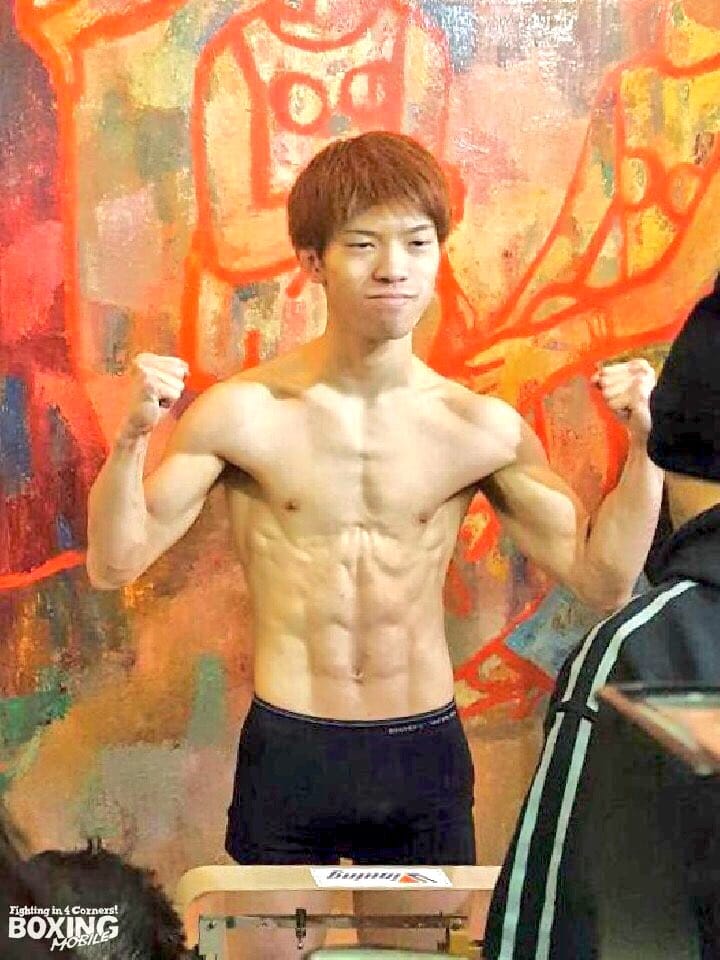 I've taken a liking in the last year to Japanese dynamo Kosei Tanaka, who is an utterly shredded 108-pound boxing champ from Japan. So much so that I decided to celebrate the new year's arrival twice -- once when Kosei did during his Dec. 31-into-Jan. 1 title fight (the J apanese hold big boxing matches on this day traditionally). Second of course, when the clock hits midnight in New York -- which hasn't happened yet. We live in an uncanny world -- I watched Kosei through a legal Japanese online feed as he basked in the confetti descending from the arena's rafters -- basically, a day before I'd see any confetti in New York at all. Why did I find this compact cannon so compelling? After all, lots of small Japanese fighters vie for titles quickly (competition is sparse at 108 lbs., as you might imagine) and then lose all their belts not long after. And it's dangerous for reporters to fall in love with certain ring stars -- that's how you overlook their flaws, to the detriment of your work and their success (a good writer knows when to give a technical tip to a pug -- though it may not be received well at first). Let's start with Kosei's physique. Granted, he's 5'4" and has less surface area to carve than most, but his musculature looks like it was sculpted by an X-acto knife. I'm not as fond of the bronze-dyed hair he sported in the ring today, but the kid has enough grit once the bell rings to pull off all manner of style beforehand. He's sponsored by Mizuno, wears a shimmering robe, and as the above headline alluded to, he wore a shirt in the ring after the match that in English proclaimed him "Knockout Dreamboy." When the fight starts, the matinee idol does take his lumps -- he has a tendency to pull straight back from oncoming punches and in so doing, take the shots right on the cheeks. But his speed and power are a wonder to behold even via the web. Brutal and bedazzlng. He throws inventive combos of jabs, uppercuts, wide hooks and long rights. But the distance of his punches seems not to matter. Yes, he might take a shot while he's punching, but when he lands, he'll equalize whatever you gave him -- and then add in far more. Because he has Golovkin-like power. That's not to say he's the hardest hitter in the game today, in a tie with GGG. It'd be a ludicrous comparison -- the kid has eight bouts his resume. But the thudding sound of his punches is very reminiscent of the sound Golovkin's shots make. They resound through the arena. His fists are like the massive cast-metal bells Japanese people ring on New Year's Day. He's a two-bell gong show, and he loves dinging that body. Will I travel to Japan to hang with him soon? I sure hope so -- for one, I have a credit on Japanese airline ANA that's gonna expire. Two, I've been studying this language for a year now, and I want the challenge of facing all those kanji signs (though I know I won't be able to read 95 percent of 'em). Kosei-san needs to circle more, pull back less, bend slightly more at the knees on defense (ie duck). He keeps his hands low because he knows his power will overwhelm a dude even if he takes some shots first. That self-destructive tactic won't work as the top levels of the game, though his fast hands do enable him to parry shots coming his way, and the respected rankings of Boxrec.com already tab him sixth in the world in his division.
It's possible he neglected defense as the new year dawned because his Mexican opponent, though carrying a 24-1-1 record, had faced pitiful competition south of the Rio Grande. The result was a TKO win for KOsei (who likes to emphasize his power on merch by using that capitalization). And yeah, the kid does look like a 21-year-old when he's wearing a shirt. He seems humble, he smiles, he eats and lives rather modestly. If he keeps winning, riches will be dangled before him that may tempt him away from that admirably unburdened lifestyle (or corrupt his naive manner). Today, at the shrine, he'll no doubt ring the bell, clap and pray for that scenario -- if only because it'll mean he's jumped from sixth in the world to two or even one. He can decide how abstemious he wants to remain then (and I dunno him well, so perhaps he's already a partier and he manages to recover from it so well one would never know). I just know that I had a great first New Year's Eve watching the kid from afar. I hope that next year I celebrate just one night -- whichever one he is celebrating, in whatever arena in the world. I've always been a sucker for "Auld Lang Syne" -- primarily because of its tune, which seems to dart right to the area of the brain most sensitive to change and prone to effecting tears. But there are also the lyrics: a call to come together made because inevitably we cannot. We'll forget lovers and friends, let alone acquaintances. And losing battles waged anyway -- against time, fate, disease -- are always romantic if not ultimately melancholy.
And then, if you're a pop culture person, each new rendition in a film or at a concert marries one more small memory to the song, so that each time you hear it, it evokes not only your estrangements -- your personal victories and defeats -- but those endured even by affecting fictional characters. I think of "Cavalcade," the Best Picture of 1933, when the British soldiers ship out to South Africa for The Boer War and they sing the song after boarding their vessel as their loved ones wave and cry below. And the boy scouts singing it to Jimmy Stewart's Jefferson Smith, just before he departs for Washington, D.C. and his new position as senator in "Mr Smith Goes to Washington." Of course, I've heard Guy Lombardo ring in the new year that way countless times thanks to YouTube. But the version I return to every year, the guaranteed tearjerker, is the inimitable, whammy barred instrumental Jimi Hendrix played at the Fillmore East in New York on Dec. 31, 1969. In nine months he'd be gone, though if he had stayed around, I dunno that the guitar would be any less potent for that. And if you're wondering why I'd want to listen to a song I know will stir me and unsettle me and make me wonder where even the last decade of my short life went, the answer is the same the NY Polar Bears will give you after jumping into the river tomorrow. A shock to the system feels cleansing. So much of the past year seems worth washing away. But really, after 365 days of just being alive -- in any year -- who couldn't use a good mental mikvah? Which isn't to say i take for granted even for a moment the often-randomly-generated path I've been granted since birth. But everything's relative. So fuck it. More whammy. Whammy with speakers on high, till I'm dancin' a third sad, a third happy and a third furious in my socks. https://www.dropbox.com/s/w37i2o4oxdbp4md/2-01%20Auld%20Lang%20Syne%20(Live).m4a?dl=0 |
|
